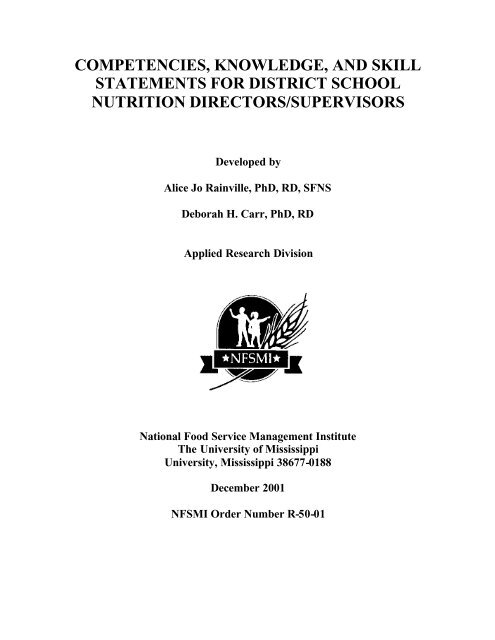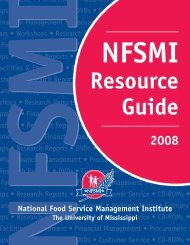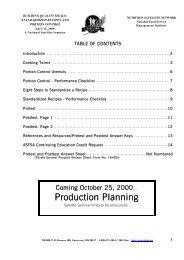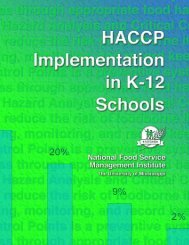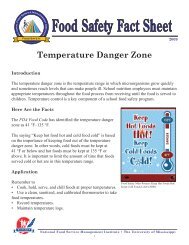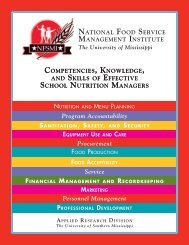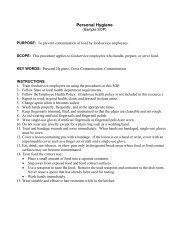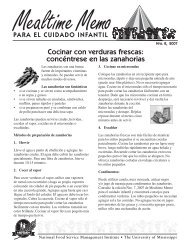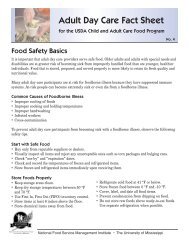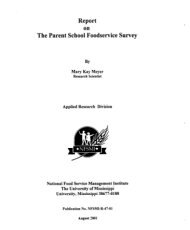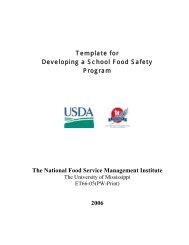Competencies, Knowledge, and Skill Statements for District School ...
Competencies, Knowledge, and Skill Statements for District School ...
Competencies, Knowledge, and Skill Statements for District School ...
- No tags were found...
You also want an ePaper? Increase the reach of your titles
YUMPU automatically turns print PDFs into web optimized ePapers that Google loves.
COMPETENCIES, KNOWLEDGE, AND SKILLSTATEMENTS FOR DISTRICT SCHOOLNUTRITION DIRECTORS/SUPERVISORSDeveloped byAlice Jo Rainville, PhD, RD, SFNSDeborah H. Carr, PhD, RDApplied Research DivisionNational Food Service Management InstituteThe University of MississippiUniversity, Mississippi 38677-0188December 2001NFSMI Order Number R-50-01
National Food Service Management InstituteThe University of MississippiBuilding the Future Through Child NutritionLocationThe National Food Service Management Institute (NFSMI) was established by Congress in 1989at The University of Mississippi in Ox<strong>for</strong>d as the resource center <strong>for</strong> Child Nutrition Programs.The Institute operates under a grant agreement with the United States Department of Agriculture,Food <strong>and</strong> Nutrition Service. The NFSMI Applied Research Division is located at The Universityof Southern Mississippi in Hattiesburg.MissionThe mission of the NFSMI is to provide in<strong>for</strong>mation <strong>and</strong> services that promote the continuousimprovement of Child Nutrition Programs.VisionThe vision of the NFSMI is to be the leader in providing education, research, <strong>and</strong> resources topromote excellence in Child Nutrition Programs.Programs <strong>and</strong> ServicesProfessional staff development opportunities <strong>and</strong> technical assistance to facilitate themanagement <strong>and</strong> operation of Child Nutrition Programs are provided through:¸¸¸¸¸Educational References <strong>and</strong> MaterialsIn<strong>for</strong>mation ServicesWorkshops <strong>and</strong> SeminarsTeleconferences <strong>and</strong> Satellite SeminarsApplied ResearchAdministrative OfficesEducation DivisionApplied Research DivisionThe University of MississippiThe University of Southern MississippiP.O. Drawer 188 Box 10077University, MS 38677-0188 Hattiesburg, MS 39406-0077Phone: 800-321-3054 Phone: 601-266-5773http://www.nfsmi.org
TABLE OF CONTENTSPreface ....................................................................................................................... ivIntroduction................................................................................................................ 1Method....................................................................................................................... 3Results........................................................................................................................ 4<strong>Competencies</strong>, <strong>Knowledge</strong>, <strong>and</strong> <strong>Skill</strong> <strong>Statements</strong> ..................................................... 7Appendix ................................................................................................................... 83iiiNATIONAL FOOD SERVICE MANAGEMENT INSTITUTE
PREFACEUnderst<strong>and</strong>ing the competencies, knowledge, <strong>and</strong> skills needed <strong>for</strong> school nutritiondirectors/supervisors is important <strong>for</strong> the advancement of those who manage Child NutritionPrograms. This publication is an updated version of the <strong>Competencies</strong>, <strong>Knowledge</strong>, <strong>and</strong> <strong>Skill</strong>s ofEffective <strong>District</strong> <strong>School</strong> Nutrition Directors/Supervisors that was published by the NationalFood Service Management Institute in 1996. This update reflects the current operational trendsin school foodservice as determined by role incumbents, state agency personnel, educators, <strong>and</strong>the NFSMI staff who critiqued the knowledge <strong>and</strong> skills statements.A special thanks is extended to Dr. Alice Jo Rainville, Eastern Michigan University <strong>and</strong> Dr.Deborah H. Carr <strong>for</strong> guiding the research update. Dr. Martha T. Conklin contributed to the earlyprogram planning <strong>for</strong> this revision: we appreciate her ef<strong>for</strong>ts to support the revision process. Weare indebted to the panel of experts who gave of their time <strong>and</strong> expertise in providing the contentin<strong>for</strong>mation <strong>for</strong> updating the competencies, knowledge, <strong>and</strong> skill statements. Our thanks are alsoextended to Ms. Amy Jones <strong>for</strong> <strong>for</strong>matting the document <strong>for</strong> publication.Denise Brown, PhD, RDDirector of Applied ResearchJane Logan, PhDExecutive DirectorivNATIONAL FOOD SERVICE MANAGEMENT INSTITUTE
every subheading. One new competency was added in Functional Area 2: Sanitation, FoodSafety, <strong>and</strong> Employee Safety. The revised document will be useful to NFSMI <strong>and</strong> otherprofessional groups to prepare school nutrition directors/supervisors <strong>for</strong> the Child NutritionProgram (CNP) challenges of the future.2NATIONAL FOOD SERVICE MANAGEMENT INSTITUTE
COMPETENCIES, KNOWLEDGE, AND SKILL STATEMENTS FORDISTRICT SCHOOL NUTRITION DIRECTORS/SUPERVISORSThe NFSMI competencies, knowledge, <strong>and</strong> skill statements <strong>for</strong> school nutritionsupervisors/directors were developed in 1995 <strong>and</strong> published in 1996. It was necessary to updatethe original document to reflect changes in regulations <strong>and</strong> current practices in school food <strong>and</strong>nutrition programs. The competencies, knowledge, <strong>and</strong> skills will need periodic review <strong>and</strong>revision to ensure they are up-to-date. This update research in 2000-2001 asked an expert panel(n=21) of role incumbents, state agency personnel, educators, <strong>and</strong> NFSMI staff to critique theknowledge <strong>and</strong> skills statements in light of current events <strong>and</strong> trends in school foodservice <strong>and</strong>make suggestions <strong>for</strong> enhancement. Following revisions by the expert panel, two sections of thedocument were sent to 75 <strong>School</strong> Foodservice <strong>and</strong> Nutrition Specialists (SFNS). Twenty-nine ofthe SFNS responded with comments <strong>and</strong> suggestions; the document was revised to reflect theirinput. The document was also reviewed by NFSMI staff <strong>for</strong> final editing.METHODIRB ApprovalThe protocol was approved by the Eastern Michigan University Human SubjectsInstitutional Review Board.Panel of ExpertsA panel of CNP experts was recruited via electronic mail. The 21-member panelconsisted of seven district-level directors, six representatives from CNP state agencies, fiveeducators with CNP expertise, <strong>and</strong> three staff members from the NFSMI Applied ResearchDivision <strong>and</strong> Education <strong>and</strong> Training Division. There was representation on the panel based ondistrict size <strong>and</strong> region of the country; panelists represented 18 states <strong>and</strong> the seven USDAregions.Electronic Delphi TechniqueThe original document was sent to panelists as an electronic mail attachment <strong>and</strong>panelists were asked to critique <strong>and</strong> update the knowledge <strong>and</strong> skill statements. Panelistsresponded through either electronic mail or U.S. mail. The comments of all panelists wereincorporated be<strong>for</strong>e beginning the editing process. Changes were noted through the use of ascript font. The edited version was sent to panelists <strong>and</strong> they again provided comments <strong>and</strong>suggestions.3NATIONAL FOOD SERVICE MANAGEMENT INSTITUTE
<strong>School</strong> Foodservice <strong>and</strong> Nutrition Specialists ReviewIn June 2001 two sections of the document that contained the most updated changes(“Sanitation, Food Safety, <strong>and</strong> Employee Safety” <strong>and</strong> “Marketing”) were sent via U.S. mail to ar<strong>and</strong>om sample of 75 <strong>School</strong> Foodservice <strong>and</strong> Nutrition Specialists (SFNS). Thirty-nine percent(n=29) of the SFNS group responded with comments <strong>and</strong> suggestions; the document was revisedto reflect their input.RESULTSThe original document contained 16 functional areas with 46 competencies <strong>and</strong> 501knowledge <strong>and</strong> skill statements. The revised document has 14 functional areas with 41competencies <strong>and</strong> 624 knowledge <strong>and</strong> skill statements. The double-column <strong>for</strong>mat featured inthe 1996 publication was changed to enhance readability.An analysis of changes in the number of knowledge <strong>and</strong> skill statements <strong>for</strong> eachfunctional area is in the appendix. The three sections that had the highest percentage of overallchanges were Program Accountability (70%), General Management (73%), <strong>and</strong> Marketing(117%). Some of these changes were due to competencies that were moved into these sectionsfrom other sections. Twenty statements were deleted. Sixteen knowledge statements movedfrom entry-level to beyond entry-level <strong>and</strong> four skill statements moved from entry-level tobeyond entry-level. Fifteen knowledge statements moved from beyond entry-level to entry-level<strong>and</strong> 32 skill statements moved from beyond entry-level to entry-level.The following changes were made to the original document based on panel suggestions:Functional Area 2: Sanitation, Food Safety, <strong>and</strong> Employee SafetyCompetency 2.3 was added. It is “Establishes procedures <strong>and</strong> policies <strong>for</strong> riskmanagement.”Functional Area 4: Food ProductionCompetency 4.2 was combined with 4.3.Functional Area 7: Nutrition <strong>and</strong> Menu PlanningCompetency 7.3 was combined with 7.1.Functional Area 8: General ManagementCompetency 8.4 was moved to Functional Area 6: Program Accountability.Competency 8.5 was moved to Functional Area 12: Marketing.Functional Area 11: Research <strong>and</strong> Development<strong>Competencies</strong> 11.1 <strong>and</strong> 11.2 were moved to Functional Area 8: GeneralManagement.4NATIONAL FOOD SERVICE MANAGEMENT INSTITUTE
Functional Area 14: Computer ApplicationsCompetency 14.2 was combined with 14.1.Functional Area 15: Professional DevelopmentCompetency 15.1 was moved to Functional Area 9: Personnel Management.Competency 15.2 was moved to Functional Area 8: General Management.APPLICATIONWell-defined competencies, knowledge, <strong>and</strong> skill statements are tools necessary <strong>for</strong> theprofessional advancement of school food <strong>and</strong> nutrition directors/supervisors. The results willassist NFSMI in developing training programs <strong>and</strong> materials based on up-to-date competencies,knowledge, <strong>and</strong> skill statements <strong>for</strong> school food <strong>and</strong> nutrition directors/supervisors. Thisdocument will assist USDA, state agency child nutrition program, <strong>and</strong> ASFSA in promoting <strong>and</strong>sponsoring lifelong learning opportunities to prepare school food <strong>and</strong> nutritiondirectors/supervisors <strong>for</strong> the CNP challenges of the future. The document will continue to serveas the foundation <strong>for</strong> the development of the <strong>School</strong> Foodservice & Nutrition Specialist (SFNS)credentialing program that serves as ASFSA’s highest level of certification. The document willneed periodic updates <strong>and</strong> revisions to reflect changes in regulations <strong>and</strong> current practices inschool food <strong>and</strong> nutrition programs.5NATIONAL FOOD SERVICE MANAGEMENT INSTITUTE
FUNCTIONAL AREA 1: CUSTOMER SERVICECOMPETENCY 1.1ESTABLISHES QUALITY STANDARDS FOR THE PRESENTATIONAND SERVICE OF FOOD.Entry-Level <strong>Knowledge</strong> <strong>Statements</strong>Knows st<strong>and</strong>ards of food quality.Knows time <strong>and</strong> temperature relationships associated with appearance <strong>and</strong> palatability of food.Knows food merch<strong>and</strong>ising techniques to enhance the presentation of food.Entry-Level <strong>Skill</strong> <strong>Statements</strong>Plans menus with foods that can be successfully <strong>and</strong> safely prepared, displayed, <strong>and</strong> served.Ensures food served meets time <strong>and</strong> temperature requirements <strong>for</strong> safe <strong>and</strong> attractive food.Measures food quality using food quality st<strong>and</strong>ardsBeyond Entry-Level <strong>Knowledge</strong> <strong>Statements</strong>Knows meal service principles that preserve food quality, promote efficiency, <strong>and</strong> enhanceserving line appearance.Knows methods <strong>for</strong> communicating food <strong>and</strong> nutrition st<strong>and</strong>ards <strong>and</strong> measurements to staff.Underst<strong>and</strong>s aesthetics of food <strong>and</strong> the role it plays in encouraging food consumption.Beyond Entry-Level <strong>Skill</strong> <strong>Statements</strong>Implements a system to maintain high st<strong>and</strong>ards in the presentation <strong>and</strong> appearance of foodthroughout the serving period.Implements a system <strong>for</strong> measuring <strong>and</strong> evaluating service delivery systems, serving techniques,appearance of serving line, <strong>and</strong> efficiency of serving area.7NATIONAL FOOD SERVICE MANAGEMENT INSTITUTE
COMPETENCY 1.2IMPLEMENTS A DISTRICT-WIDE CUSTOMER SERVICE DRIVENPHILOSOPHY THAT FOCUSES ON VALUE AND SATISFACTION.Entry-Level <strong>Knowledge</strong> <strong>Statements</strong>Knows fundamentals of creating a pleasant, appealing, <strong>and</strong> safe environment <strong>for</strong> servingcustomers nutritious meals.Knows techniques to facilitate cooperative interactions between customers <strong>and</strong> CNP personnel.Entry-Level <strong>Skill</strong> <strong>Statements</strong>Creates a positive <strong>and</strong> customer-friendly environment that encourages customer interaction.Responds to customer comments <strong>and</strong> suggestions in a pleasant <strong>and</strong> positive manner.Identifies customer food <strong>and</strong> service needs <strong>and</strong> desires as a basis <strong>for</strong> developing strategies <strong>for</strong>change.Uses employee teams to promote continuous quality improvement of customer meal service tostudents, parents, teachers, school staff, administrators, <strong>and</strong> community members.Develops rapport with students, administrators, teachers, parents, <strong>and</strong> CNP personnel to developa better underst<strong>and</strong>ing of customer needs <strong>and</strong> desires <strong>for</strong> meal service.Recruits <strong>and</strong> hires customer-service oriented employees.Trains <strong>and</strong> develops customer-service oriented employees.Beyond Entry-Level <strong>Knowledge</strong> <strong>Statements</strong>Knows methods <strong>for</strong> tracking <strong>and</strong> measuring customer satisfaction with CNP.Knows current trends in service popular with customers <strong>and</strong> how to determine the costeffectiveness.8NATIONAL FOOD SERVICE MANAGEMENT INSTITUTE
COMPETENCY 1.2IMPLEMENTS A DISTRICT-WIDE CUSTOMER SERVICE DRIVENPHILOSOPHY THAT FOCUSES ON VALUE AND SATISFACTION.Beyond Entry-Level <strong>Skill</strong> <strong>Statements</strong>Establishes <strong>and</strong> communicates quality customer service st<strong>and</strong>ards to the CNP staff.Develops a system <strong>for</strong> measuring quality of service <strong>and</strong> personnel per<strong>for</strong>mance to achieve bettercustomer satisfaction <strong>and</strong> higher customer participation.Creates a positive atmosphere where customer issues are dealt with quickly <strong>and</strong> competently.Encourages the CNP staff to deal with customer issues <strong>and</strong> to exceed customer expectations.9NATIONAL FOOD SERVICE MANAGEMENT INSTITUTE
FUNCTIONAL AREA 2: SANITATION, FOOD SAFETY, AND EMPLOYEE SAFETYCOMPETENCY 2.1ESTABLISHES PROCEDURES TO ENSURE THAT FOOD ISPREPARED AND SERVED IN A SANITARY AND SAFE ENVIRONMENT.Entry-Level <strong>Knowledge</strong> <strong>Statements</strong>Knows basic principles of foodservice sanitation <strong>and</strong> food safety.Knows principles of microbiology related to the prevention of foodborne illnesses.Knows principles <strong>for</strong> selecting, storing, using, <strong>and</strong> maintaining chemical supplies <strong>and</strong> otherhazardous materials.Knows principles of safe food h<strong>and</strong>ling using hazard analysis critical control point (HACCP).Knows strategies to monitor foodservice areas <strong>for</strong> sanitation <strong>and</strong> food safety.Knows local, state, <strong>and</strong> federal sanitation <strong>and</strong> food safety requirements <strong>for</strong> foodserviceestablishments.Entry-Level <strong>Skill</strong> <strong>Statements</strong>Manages food safety <strong>and</strong> sanitation using HACCP principles as a guide.Identifies the critical control points in the flow of food through the foodservice operation toassure food safety.Develops comprehensive procedures <strong>for</strong> monitoring <strong>and</strong> maintaining proper temperatures of foodat all points in the flow of food from receiving through serving.Develops <strong>and</strong> monitors policies <strong>for</strong> storing chemical <strong>and</strong> cleaning compounds in an areaseparated from foods, supplies, <strong>and</strong> dish room areas.Develops <strong>and</strong> monitors safe, effective methods <strong>for</strong> prevention <strong>and</strong> control of insects, rodents, <strong>and</strong>other pest infestations.Conducts routine food safety <strong>and</strong> sanitation inspections <strong>and</strong> implements corrective action plans.Implements a sanitation training program <strong>for</strong> foodservice staff.10NATIONAL FOOD SERVICE MANAGEMENT INSTITUTE
COMPETENCY 2.1ESTABLISHES PROCEDURES TO ENSURE THAT FOOD ISPREPARED AND SERVED IN A SANITARY AND SAFE ENVIRONMENT.Entry-Level <strong>Skill</strong> <strong>Statements</strong>, continuedMaintains appropriate records pertaining to foodservice sanitation, including in-house inspectionreports, health department inspection reports, temperature logs, or other required documentation.Beyond Entry-Level <strong>Knowledge</strong> <strong>Statements</strong>Knows procedures <strong>for</strong> reporting possible compliance problems in food processing <strong>and</strong> packagingpractices <strong>for</strong> USDA commodities <strong>and</strong> purchased foods to USDA’s Food Safety <strong>and</strong> InspectionService (FSIS).Beyond Entry-Level <strong>Skill</strong> <strong>Statements</strong>Establishes a communication system with federal <strong>and</strong> state authorities regarding complianceproblems in food processing <strong>and</strong> packaging.Establishes communication procedures within the school district regarding food safety issues.Develops emergency procedures <strong>and</strong> practices <strong>for</strong> food recalls <strong>and</strong> foodborne illnesses.11NATIONAL FOOD SERVICE MANAGEMENT INSTITUTE
COMPETENCY 2.2DEVELOPS AND INTEGRATES EMPLOYEE SAFETY REGULATIONS INTOALL PHASES OF THE SCHOOL FOODSERVICE OPERATION.Entry-Level <strong>Knowledge</strong> <strong>Statements</strong>Knows principles of creating <strong>and</strong> maintaining a safe work environment <strong>and</strong> underst<strong>and</strong>simportance of such an environment.Knows Occupational Safety <strong>and</strong> Health Act (OSHA) <strong>and</strong> other laws that govern safety st<strong>and</strong>ardsthat apply to foodservice establishments.Knows National Sanitation Foundation (NSF) designation <strong>and</strong> how it impacts equipment design<strong>and</strong> purchasing decisions.Knows safety st<strong>and</strong>ards <strong>for</strong> selecting <strong>and</strong> using chemicals, hazardous materials, <strong>and</strong> equipment<strong>for</strong> maintaining facilities.Knows school district’s policies <strong>for</strong> reporting accidents <strong>and</strong> injuries.Entry-Level <strong>Skill</strong> <strong>Statements</strong>Encourages employee participation in creating a safe work environment.Develops safety guidelines <strong>and</strong> procedures <strong>for</strong> injury prevention.Develops safety requirements <strong>and</strong> st<strong>and</strong>ards <strong>for</strong> selection <strong>and</strong> use of chemicals, hazardousmaterials, <strong>and</strong> equipment.Develops procedures <strong>and</strong> trains employees on proper use, cleaning, <strong>and</strong> sanitizing of foodserviceequipment.Ensures that the Material Safety Data Sheets are up to date <strong>and</strong> accessible to employees perfederal, state, <strong>and</strong> local regulations.Ensures employee training on the proper use of fire extinguishers.Provides first aid kits in all foodservice facilities.Ensures first aid training <strong>for</strong> employees.12NATIONAL FOOD SERVICE MANAGEMENT INSTITUTE
COMPETENCY 2.2DEVELOPS AND INTEGRATES EMPLOYEE SAFETY REGULATIONS INTOALL PHASES OF THE SCHOOL FOODSERVICE OPERATION.Entry-Level <strong>Skill</strong> <strong>Statements</strong>, continuedEnsures employee training <strong>for</strong> lifting <strong>and</strong> moving objects to prevent muscle <strong>and</strong> back injuries.Monitors <strong>and</strong> tracks incidence of job-related injuries.Implements a system <strong>for</strong> routine maintenance <strong>and</strong> repair of all foodservice equipment, includingfire extinguisher systems.Develops <strong>and</strong> implements emergency procedures <strong>for</strong> facility evacuation in case of fire, gas leaks,<strong>and</strong> other emergencies.Establishes <strong>and</strong> implements policies <strong>for</strong> posting of workplace safety in<strong>for</strong>mation.Beyond Entry-Level <strong>Knowledge</strong> <strong>Statements</strong>Knows methods <strong>for</strong> training or resources to provide training <strong>for</strong> employees in emergencyprocedures such as cardiac pulmonary resuscitation (CPR), the Heimlich maneuver, illness orinjury resulting in the loss of bodily fluids, <strong>and</strong> other on-the-job injuries.Knows methods of evaluating job-related injuries to determine cause of injury.Knows methods of determining the cost of job-related injuries.Beyond Entry-Level <strong>Skill</strong> <strong>Statements</strong>Identifies <strong>and</strong> evaluates employee behavior patterns that could lead to accidents on the job.Initiates <strong>and</strong>/or maintains a safety training <strong>and</strong> incentive program based on needs to improveemployee work practices <strong>and</strong> emergency procedures.Documents safety training <strong>and</strong> collaborates with district safety officials.Monitors compliance with health <strong>and</strong> safety rules established by federal (OSHA), state, <strong>and</strong> localagencies.13NATIONAL FOOD SERVICE MANAGEMENT INSTITUTE
COMPETENCY 2.2DEVELOPS AND INTEGRATES EMPLOYEE SAFETY REGULATIONS INTOALL PHASES OF THE SCHOOL FOODSERVICE OPERATION.Beyond Entry-Level <strong>Skill</strong> <strong>Statements</strong>, continuedMonitors the cost of job-related injuries.Evaluates safety features when planning <strong>for</strong> purchase of equipment.Implements a system <strong>for</strong> maintaining ventilation hoods <strong>and</strong> other high-risk heat generatingequipment.14NATIONAL FOOD SERVICE MANAGEMENT INSTITUTE
COMPETENCY 2.3ESTABLISHES PROCEDURES AND POLICIES FOR RISK MANAGEMENT.Entry-Level <strong>Knowledge</strong> <strong>Statements</strong>Knows the principles of risk management.Entry-Level <strong>Skill</strong> <strong>Statements</strong>Monitors foodservice operations <strong>for</strong> risks.Beyond Entry-Level <strong>Knowledge</strong> <strong>Statements</strong>Collaborates with district administration on risk management strategies.Recognizes a crisis as any situation that may have a negative impact on the CNP.Beyond Entry-Level <strong>Skill</strong> <strong>Statements</strong>Assembles a crisis management team when needed.Develops a crisis plan that outlines the functions of each team member.Develops an emergency directory <strong>and</strong> contact list.Develops a systematic approach to identify <strong>and</strong> prioritize potential risks <strong>and</strong> threats to the CNP.15NATIONAL FOOD SERVICE MANAGEMENT INSTITUTE
FUNCTIONAL AREA 3: FINANCIAL MANAGEMENT AND RECORD KEEPINGCOMPETENCY 3.1ESTABLISHES MEASURABLE FINANCIAL OBJECTIVES AND GOALS FORTHE CNP.Entry-Level <strong>Knowledge</strong> <strong>Statements</strong>Knows fundamentals of effective financial management practices.Knows methods to <strong>for</strong>ecast operational revenues <strong>and</strong> expenditures.Knows process <strong>for</strong> budget development, justification, <strong>and</strong> implementation.Knows financial goals <strong>and</strong> objectives of the district’s Board of Education.Entry-Level <strong>Skill</strong> <strong>Statements</strong>Works with school administration, school managers, <strong>and</strong> staff to identify the desired financialoutcomes <strong>for</strong> the CNP.Involves school managers <strong>and</strong> staff in setting <strong>and</strong> meeting CNP financial goals <strong>for</strong> the school <strong>and</strong>school district.Establishes <strong>and</strong>/or manages CNP operational budget based on program goals <strong>and</strong> districtguidelines.Projects revenue sources <strong>and</strong> expenditures <strong>for</strong> both present <strong>and</strong> future enrollments.Addresses issues of non-compliance <strong>and</strong>/or budget variance in a timely fashion.Beyond Entry-Level <strong>Knowledge</strong> <strong>Statements</strong>Knows process <strong>for</strong> incorporating CNP budget into the district budget.Knows methods <strong>for</strong> calculating financial per<strong>for</strong>mance indicators.Knows methods <strong>for</strong> <strong>for</strong>ecasting growth <strong>and</strong> expansion needs based on changing demographics.16NATIONAL FOOD SERVICE MANAGEMENT INSTITUTE
COMPETENCY 3.1ESTABLISHES MEASURABLE FINANCIAL OBJECTIVES AND GOALS FORTHE CNP.Beyond Entry-Level <strong>Skill</strong> <strong>Statements</strong>Sets per<strong>for</strong>mance st<strong>and</strong>ards <strong>for</strong> sound financial management <strong>and</strong> articulates st<strong>and</strong>ards tomanagers <strong>and</strong> administration.Develops <strong>and</strong> submits budget amendments to cover unanticipated program changes <strong>and</strong> providesdocumentation to support variances.Develops strategies to achieve financial accountability.17NATIONAL FOOD SERVICE MANAGEMENT INSTITUTE
COMPETENCY 3.2MANAGES THE CNP USING APPROPRIATE FINANCIAL MANAGEMENTTECHNIQUES.Entry-Level <strong>Knowledge</strong> <strong>Statements</strong>Knows basic principles of accounting <strong>and</strong> the application of those principles.Knows fundamentals of preparing a financial plan <strong>and</strong> operating budget.Knows the relationship of revenue <strong>and</strong> expenditure categories to profit/loss margins.Entry-Level <strong>Skill</strong> <strong>Statements</strong>Shares in<strong>for</strong>mation with staff concerning financial issues <strong>and</strong> develops strategies <strong>for</strong> addressingthe issues.Reports budget status to district administrators <strong>and</strong> Board of Education.Analyzes revenues <strong>and</strong> expenditures <strong>and</strong> makes program adjustments to obtain desired financialgoals.Establishes st<strong>and</strong>ard financial operating procedures <strong>for</strong> the school district’s CNP.Controls food cost by ensuring use of st<strong>and</strong>ardized recipes, portion sizes, <strong>and</strong> productingredients.Analyzes financial statements to make sound financial decisions.Maintains labor cost by monitoring labor hours in relation to meals served <strong>and</strong> employeebenefits.Establishes <strong>and</strong> maintains inventory policy.Reconciles projected annual budget with actual revenue <strong>and</strong> expenditure per<strong>for</strong>mance.Beyond Entry-Level <strong>Knowledge</strong> <strong>Statements</strong>Knows the importance of protecting the financial integrity of the program.18NATIONAL FOOD SERVICE MANAGEMENT INSTITUTE
COMPETENCY 3.2MANAGES THE CNP USING APPROPRIATE FINANCIAL MANAGEMENTTECHNIQUES.Beyond Entry-Level <strong>Knowledge</strong> <strong>Statements</strong>, continuedKnows the elements of proper internal financial controls.Knows methods to calculate key ratios <strong>for</strong> use in comparing financial per<strong>for</strong>mance across timeperiods <strong>and</strong> to industry benchmarks.Regularly per<strong>for</strong>ms audits on all aspects of the program to identify <strong>and</strong> control problem areas.Beyond Entry-Level <strong>Skill</strong> <strong>Statements</strong>Maintains program integrity in use of funds.Projects annual revenue by funding source <strong>and</strong> expenditures by operational category.Establishes a pricing structure <strong>for</strong> all CNP categories that follows local, state, <strong>and</strong> federalguidelines.Determines financial per<strong>for</strong>mance of individual school sites <strong>and</strong> makes appropriate adjustmentsto achieve desired financial goals.19NATIONAL FOOD SERVICE MANAGEMENT INSTITUTE
COMPETENCY 3.3IMPLEMENTS EFFICIENT MANAGEMENT TECHNIQUES TO ENSURE ALLRECORDS AND SUPPORTING DOCUMENTATION ARE MAINTAINED INACCORDANCE WITH LOCAL, STATE, AND FEDERAL LAWS ANDPOLICIES.Entry-Level <strong>Knowledge</strong> <strong>Statements</strong>Knows all local, state, <strong>and</strong> federal requirements <strong>for</strong> maintaining accurate <strong>and</strong> appropriaterecords.Knows procedures <strong>for</strong> preparing accurate reports in a timely manner.Knows appropriate length of time to retain financial records.Entry-Level <strong>Skill</strong> <strong>Statements</strong>Ensures the accountability system used in the CNP is reliable <strong>and</strong> provides accurate data on atimely basis.Develops a simplified system to maintain appropriate foodservice records to meet local, state,<strong>and</strong> federal guidelines.Monitors procedures <strong>for</strong> storage of financial records.Establishes <strong>and</strong> implements written procedures <strong>for</strong> collecting, depositing, <strong>and</strong> disbursing funds.Establishes <strong>and</strong> reviews all meal count <strong>and</strong> cash h<strong>and</strong>ling procedures.Establishes an effective system <strong>for</strong> organizing records <strong>and</strong> preparing reports according to local,state, <strong>and</strong> federal guidelines.Beyond Entry-Level <strong>Knowledge</strong> <strong>Statements</strong>Knows methods <strong>for</strong> technology application in financial management.Knows CNP audit procedures, administrative review, <strong>and</strong> compliance requirements.20NATIONAL FOOD SERVICE MANAGEMENT INSTITUTE
COMPETENCY 3.3IMPLEMENTS EFFICIENT MANAGEMENT TECHNIQUES TO ENSURE ALLRECORDS AND SUPPORTING DOCUMENTATION ARE MAINTAINED INACCORDANCE WITH LOCAL, STATE, AND FEDERAL LAWS ANDPOLICIES.Beyond Entry-Level <strong>Skill</strong> <strong>Statements</strong>Uses financial management in<strong>for</strong>mation system software to enhance financial reporting <strong>and</strong>accountability.Responds to auditors during audit procedures.21NATIONAL FOOD SERVICE MANAGEMENT INSTITUTE
FUNCTIONAL AREA 4: FOOD PRODUCTIONCOMPETENCY 4.1DEVELOPS PROCEDURES TO ENSURE THE FOOD PRODUCTION SYSTEMPROVIDES SAFE NUTRITIOUS FOOD OF HIGH QUALITY.Entry-Level <strong>Knowledge</strong> <strong>Statements</strong>Knows st<strong>and</strong>ards <strong>for</strong> control of quality <strong>and</strong> quantity food production <strong>and</strong> distribution, reflectingnutrition objectives.Knows principles of food science <strong>and</strong> fundamentals of flavor enhancement related to quantityfood production, holding, <strong>and</strong> serving.Knows staff training techniques related to food production.Underst<strong>and</strong>s how different food production systems operate.Entry-Level <strong>Skill</strong> <strong>Statements</strong>Establishes procedures <strong>for</strong> food receiving, storage, production, <strong>and</strong> service that conserve thenutritive value, enhance flavor <strong>and</strong> attractiveness of final product.Evaluates menus <strong>for</strong> cost, nutritional content, customer acceptability, equipment dem<strong>and</strong>s, timerequirements, <strong>and</strong> labor constraints.Establishes procedures <strong>for</strong> efficient food production.Implements production planning procedures including production schedules, st<strong>and</strong>ardizedrecipes, <strong>and</strong> portion control instructions.Ensures staff receives proper training <strong>and</strong> instructions on food production techniques.Establishes procedures to maintain required daily food production records at each site.Works with staff to evaluate the food production system <strong>and</strong> food quality <strong>and</strong> revise the systemas needed.22NATIONAL FOOD SERVICE MANAGEMENT INSTITUTE
COMPETENCY 4.1DEVELOPS PROCEDURES TO ENSURE THE FOOD PRODUCTION SYSTEMPROVIDES SAFE NUTRITIOUS FOOD OF HIGH QUALITY.Beyond Entry-Level <strong>Knowledge</strong> <strong>Statements</strong>Knows fundamentals <strong>for</strong> developing a continuous quality improvement system <strong>for</strong> foodproduction.Knows food preparation techniques that allow <strong>for</strong> efficient use of product, labor, <strong>and</strong> equipment.Knows methods to effectively implement change in food production procedures.Knows <strong>for</strong>ecasting methods.Beyond Entry-Level <strong>Skill</strong> <strong>Statements</strong>Evaluates food production systems to determine the most effective one(s) <strong>for</strong> the CNP.Develops safe <strong>and</strong> efficient work methods to complete tasks based on time <strong>and</strong> motionprinciples.Employs <strong>for</strong>ecasting methods <strong>for</strong> maximum operational efficiency.Trains staff in production <strong>and</strong> <strong>for</strong>ecasting procedures.Implements procedures to involve customers in testing new recipes <strong>and</strong> food products.Evaluates <strong>and</strong> responds to change as needed.23NATIONAL FOOD SERVICE MANAGEMENT INSTITUTE
COMPETENCY 4.2ENSURES OPERATIONAL PROCEDURES FOR EFFICIENT AND EFFECTIVEFOOD PRODUCTION AND DISTRIBUTION.Entry-Level <strong>Knowledge</strong> <strong>Statements</strong>Knows methods to operate foodservice equipment.Knows procedures <strong>for</strong> documenting <strong>and</strong> evaluating amounts of food planned, prepared, <strong>and</strong>served.Knows appropriate portion control procedures.Knows methods to st<strong>and</strong>ardize recipes.Entry-Level <strong>Skill</strong> <strong>Statements</strong>Trains staff to operate foodservice equipment.Implements procedures <strong>for</strong> portion control <strong>and</strong> monitors their usage regularly.Develops a system of consistent <strong>and</strong> accurate documentation <strong>for</strong> food production.Directs the use <strong>and</strong> development of st<strong>and</strong>ardized recipes <strong>for</strong> controlling food quality, recipeyield, <strong>and</strong> portion size.Develops <strong>and</strong> monitors CNP food production methods to assure the yield of high-quality foodthat meets nutrition objectives.Beyond Entry-Level <strong>Knowledge</strong> <strong>Statements</strong>Knows methods to determine staff productivity.Knows methods to evaluate food distribution systems.Beyond Entry-Level <strong>Skill</strong> <strong>Statements</strong>Establishes an effective food distribution system <strong>for</strong> all sites in the CNP.24NATIONAL FOOD SERVICE MANAGEMENT INSTITUTE
COMPETENCY 4.2ENSURES OPERATIONAL PROCEDURES FOR EFFICIENT AND EFFECTIVEFOOD PRODUCTION AND DISTRIBUTION.Beyond Entry-Level <strong>Skill</strong> <strong>Statements</strong>, continuedEstablishes <strong>and</strong> applies work st<strong>and</strong>ards <strong>for</strong> productivity of meals (i.e., meals per labor hour).Develops methods <strong>for</strong> recipe modification, implementing nutrition objectives, <strong>and</strong> increasingcustomer acceptability.25NATIONAL FOOD SERVICE MANAGEMENT INSTITUTE
FUNCTIONAL AREA 5: PROCUREMENTCOMPETENCY 5.1IMPLEMENTS A COST-EFFECTIVE PROCUREMENT SYSTEM.Entry-Level <strong>Knowledge</strong> <strong>Statements</strong>Knows local, state, <strong>and</strong> federal purchasing policies <strong>and</strong> procedures.Knows ethical practices <strong>for</strong> procurement.Knows fundamentals of procurement.Knows methods to order accurate amounts of food to meet meal/snack pattern requirements.Knows cost control principles applicable to procurement.Entry-Level <strong>Skill</strong> <strong>Statements</strong>Follows local, state, <strong>and</strong> federal laws <strong>and</strong> regulations that govern the safety of the food supply.Develops <strong>and</strong> implements procurement practices consistent with nutrition objectives <strong>and</strong>procurement requirements.Develops procurement procedures <strong>for</strong> individual schools to order, receive, <strong>and</strong> store productsconsistent with local, state, <strong>and</strong> federal regulations.Develops an inventory control system that addresses the delivery date, storage, <strong>and</strong> turnover rateof all products.Ensures open <strong>and</strong> free competition in the marketplace.Beyond Entry-Level <strong>Knowledge</strong> <strong>Statements</strong>Knows basic principles of <strong>for</strong>mal <strong>and</strong> in<strong>for</strong>mal bidding.Knows laws <strong>and</strong> regulations that safeguard the food supply <strong>and</strong> their application to theprocurement of food.Assesses the feasibility of methods of purchasing including bid buying, prime vendors, <strong>and</strong>group purchasing.26NATIONAL FOOD SERVICE MANAGEMENT INSTITUTE
COMPETENCY 5.1IMPLEMENTS A COST-EFFECTIVE PROCUREMENT SYSTEM.Beyond Entry-Level <strong>Skill</strong> <strong>Statements</strong>Evaluates price bids/quotes <strong>and</strong> selects or recommends vendors or group purchasing planaccording to established local, state, <strong>and</strong> federal regulations.Implements or develops a district procurement plan to guide the appropriate purchasing methods<strong>for</strong> the CNP.Evaluates current purchasing practices to determine effectiveness.27NATIONAL FOOD SERVICE MANAGEMENT INSTITUTE
COMPETENCY 5.2DEVELOPS PURCHASING GUIDELINES TO ENSURE PURCHASED FOODAND SUPPLIES REFLECT PRODUCT KNOWLEDGE, CUSTOMERPREFERENCES, DISTRICT NEEDS, POLICIES, AND NUTRITIONOBJECTIVES.Entry-Level <strong>Knowledge</strong> <strong>Statements</strong>Knows fundamentals of developing product specifications <strong>for</strong> all items purchased by the CNP.Knows importance of food labeling laws <strong>and</strong> regulations in determining compliance with productidentification.Knows methods <strong>for</strong> <strong>for</strong>ecasting quantities of food <strong>and</strong> supplies needed to operate the CNP as acost-effective business.Knows structure of USDA commodity program.Entry-Level <strong>Skill</strong> <strong>Statements</strong>Develops a system <strong>for</strong> br<strong>and</strong> approval that ensures a quality product with broad customeracceptability without restricting competition.Maintains system to document nutrient content of food products purchased.Develops products specifications/descriptions based on nutrition objectives, customerpreferences, <strong>and</strong> production systems.Develops specifications <strong>for</strong> purchasing supplies <strong>and</strong> equipment <strong>for</strong> the CNP based on theproduction system.Updates product specifications/descriptions through pre-bid conferences, producttesting/screening, <strong>and</strong> product comparison.Implements a system to maximize use of USDA commodities.Beyond Entry-Level <strong>Knowledge</strong> <strong>Statements</strong>Knows communication techniques to enhance the in<strong>for</strong>mation flow between districtprocurement, manufacturer, distributor/vendor, <strong>and</strong> school receiving staff.28NATIONAL FOOD SERVICE MANAGEMENT INSTITUTE
COMPETENCY 5.2DEVELOPS PURCHASING GUIDELINES TO ENSURE PURCHASED FOODAND SUPPLIES REFLECT PRODUCT KNOWLEDGE, CUSTOMERPREFERENCES, DISTRICT NEEDS, POLICIES, AND NUTRITIONOBJECTIVES.Beyond Entry-Level <strong>Skill</strong> <strong>Statements</strong>Provides a district purchasing profile to assist industry representatives in meeting district needs<strong>and</strong> services.Clearly communicates in<strong>for</strong>mation about purchased products.Develops purchasing st<strong>and</strong>ards that include nutrient product in<strong>for</strong>mation to meet nutritionobjectives.Updates knowledge of products by maintaining adequate communication with industry <strong>and</strong>others.29NATIONAL FOOD SERVICE MANAGEMENT INSTITUTE
COMPETENCY 5.3ESTABLISHES STANDARDS FOR RECEIVING, STORING, ANDINVENTORYING FOOD AND NON-FOOD SUPPLIES BASED ON SOUNDPRINCIPLES OF MANAGEMENT.Entry-Level <strong>Knowledge</strong> <strong>Statements</strong>Knows receiving procedures that ensure food safety, quantity, <strong>and</strong> quality control.Knows established procedures <strong>for</strong> verifying receipt of specified products.Knows the importance of communicating product purchase records <strong>and</strong> delivery dates betweenthe supplier <strong>and</strong> the receiving location.Knows current principles/recommendations <strong>for</strong> storing <strong>and</strong> inventorying food <strong>and</strong> non-foodsupplies to ensure quality <strong>and</strong> financial control.Entry-Level <strong>Skill</strong> <strong>Statements</strong>Ensures that correct product is delivered based on terms of the contract <strong>and</strong> trains personnel inthese methods.Implements procedures <strong>for</strong> returning <strong>and</strong> crediting unacceptable merch<strong>and</strong>ise <strong>and</strong> ensuring onlyauthorized substitutions are accepted.Establishes a communication process between the supplier <strong>and</strong> receiving location.Implements procedures to verify receipt of orders as placed.Establishes a system <strong>for</strong> matching quantity <strong>and</strong> quality of product received against productidentification on delivery ticket/invoice.Develops procedures to certify that product received is properly counted/weighed <strong>and</strong> meetsspecifications.Reviews system to assure storage areas are temperature controlled, properly maintained, wellventilated, <strong>and</strong> adequately secured.Monitors deliveries to ensure time, temperature, product quality, <strong>and</strong> transportation requirementsare met.30NATIONAL FOOD SERVICE MANAGEMENT INSTITUTE
COMPETENCY 5.3ESTABLISHES STANDARDS FOR RECEIVING, STORING, ANDINVENTORYING FOOD AND NON-FOOD SUPPLIES BASED ON SOUNDPRINCIPLES OF MANAGEMENT.Entry-Level <strong>Skill</strong> <strong>Statements</strong>, continuedDevelops procedures <strong>for</strong> maintaining sanitation <strong>and</strong> proper temperatures in storage facilities.Directs inventory procedures that are consistent with local, state, <strong>and</strong> federal guidelines.Beyond Entry-Level <strong>Knowledge</strong> <strong>Statements</strong>Knows methods <strong>for</strong> record keeping.Knows methods <strong>for</strong> effective implementation of a central warehouse system when appropriate.Beyond Entry-Level <strong>Skill</strong> <strong>Statements</strong>Develops a feedback system that provides adequate in<strong>for</strong>mation, including recalls or holds, aboutproducts received.Selects <strong>and</strong> maintains transport equipment <strong>and</strong> vehicles when appropriate.Uses technology to the greatest extent possible to simplify procurement system.31NATIONAL FOOD SERVICE MANAGEMENT INSTITUTE
FUNCTIONAL AREA 6: PROGRAM ACCOUNTABILITYCOMPETENCY 6.1ENSURES CNP COMPLIANCE WITH ALL LOCAL, STATE,AND FEDERAL LAWS, REGULATIONS, AND POLICIES.Entry-Level <strong>Knowledge</strong> <strong>Statements</strong>Knows importance of nutritional, financial, <strong>and</strong> regulatory accountability to the integrity ofCNPs.Knows <strong>and</strong> underst<strong>and</strong>s the components of local, state, <strong>and</strong> federal regulations <strong>and</strong> guidelines,including policies <strong>and</strong> agreements, that govern CNP operations.Knows importance of following written procedures <strong>and</strong> criteria necessary <strong>for</strong> documenting <strong>and</strong>monitoring of all phases of the school district’s CNP.Entry-Level <strong>Skill</strong> <strong>Statements</strong>Maintains a detailed description of free/reduced price meal eligibility approval process.Ensures all applications <strong>for</strong> meal benefits are correctly approved in a timely manner <strong>and</strong> rostersupdated as changes occur.Ensures completion of the verification process <strong>for</strong> meal/snack benefits according to USDArequirements.Establishes <strong>and</strong> maintains a written procedure <strong>for</strong> an accurate meal/snack count of reimbursablemeals/snacks at the point of service.Ensures all school meals/snacks are planned <strong>and</strong> served in accordance with current local, state,<strong>and</strong> federal regulations <strong>and</strong> nutrition objectives.Develops procedures <strong>and</strong> <strong>for</strong>ms to maintain accurate <strong>and</strong> appropriate records that comply withlocal, state, <strong>and</strong> federal regulations.Beyond Entry-Level <strong>Knowledge</strong> <strong>Statements</strong>Knows importance of monitoring audits <strong>for</strong> ensuring compliance.32NATIONAL FOOD SERVICE MANAGEMENT INSTITUTE
COMPETENCY 6.1ENSURES CNP COMPLIANCE WITH ALL LOCAL, STATE,AND FEDERAL LAWS, REGULATIONS, AND POLICIES.Beyond Entry-Level <strong>Skill</strong> <strong>Statements</strong>Develops a comprehensive internal audit/evaluation system <strong>for</strong> reviewing all aspects of theprogram <strong>and</strong> regularly per<strong>for</strong>ms audits in all areas to ensure compliance.33NATIONAL FOOD SERVICE MANAGEMENT INSTITUTE
COMPETENCY 6.2PROVIDES TECHNICAL ASSISTANCE AND TRAINING FORSCHOOL FOODSERVICE PERSONNEL, SCHOOL ADMINISTRATORS, ANDOTHER SCHOOL SUPPORT STAFF.Entry-Level <strong>Knowledge</strong> <strong>Statements</strong>Knows basic training process.Knows methods <strong>for</strong> communicating to administrators <strong>and</strong> community stakeholders the need <strong>for</strong>continuing education <strong>for</strong> CNP personnel.Entry-Level <strong>Skill</strong> <strong>Statements</strong>Demonstrates the ability to communicate effectively <strong>and</strong> dialogue with school administrators.Presents programs about the CNP to school administrators, school boards, parents, <strong>and</strong> civicorganizations.Trains school foodservice staff <strong>and</strong> other school support staff.Beyond Entry-Level <strong>Knowledge</strong> <strong>Statements</strong>Knows approaches <strong>for</strong> obtaining technical in<strong>for</strong>mation <strong>and</strong> educational materials appropriate <strong>for</strong>training.Knows importance of networking with agencies concerned with CNPs.Beyond Entry-Level <strong>Skill</strong> <strong>Statements</strong>Develops an ongoing system of in<strong>for</strong>ming CNP personnel, school administrators, parents, <strong>and</strong>school staff of CNP policy updates <strong>and</strong> current in<strong>for</strong>mation <strong>for</strong> program underst<strong>and</strong>ing.Develops a network with all agencies concerned with CNPs including but not limited to WIC,food stamps, <strong>and</strong> CHIPS.Conducts or facilitates the presentation of training sessions in all pertinent areas includingaccountability, CNP guidelines, nutrition, or other appropriate topics.Obtains technical in<strong>for</strong>mation <strong>and</strong> educational materials to be used in training.34NATIONAL FOOD SERVICE MANAGEMENT INSTITUTE
COMPETENCY 6.3DEVELOPS GUIDELINES FOR PROVIDING SERVICES IN RESPONSE TODISASTER OR EMERGENCY SITUATIONS.Entry-Level <strong>Knowledge</strong> <strong>Statements</strong>Knows the importance of the district’s disaster plan.Knows importance of networking with community disaster agencies (Red Cross, SalvationArmy, or local agencies).Entry-Level <strong>Skill</strong> <strong>Statements</strong>Is an active member of the district’s disaster planning team.Establishes <strong>and</strong> communicates a basic plan <strong>for</strong> dealing with an emergency/disaster situation toemergency personnel <strong>and</strong> appropriate school staff.Beyond Entry-Level <strong>Knowledge</strong> <strong>Statements</strong>Knows objectives <strong>and</strong> details of school district emergency plan.Knows local, state, <strong>and</strong> federal regulations <strong>for</strong> providing services <strong>and</strong> using USDA commoditiesin an emergency situation.Beyond Entry-Level <strong>Skill</strong> <strong>Statements</strong>Maintains an updated list of employee designations <strong>and</strong> alternates to district facilities in case of acommunity-wide disaster.Establishes emergency purchasing agreements with local food suppliers to help feed disastervictims housed in shelters.Implements emergency evacuation procedures <strong>for</strong> CNP personnel in case of a school disaster.Collaborates with other officials to prepare emergency communication plans that can be used byCNP personnel.35NATIONAL FOOD SERVICE MANAGEMENT INSTITUTE
COMPETENCY 6.3DEVELOPS GUIDELINES FOR PROVIDING SERVICES IN RESPONSE TODISASTER OR EMERGENCY SITUATIONS.Beyond Entry-Level <strong>Skill</strong> <strong>Statements</strong>, continuedDevelops a plan <strong>for</strong> communicating with appropriate state <strong>and</strong>/or federal officials concerning theuse of government commodities <strong>for</strong> disaster relief.Develops an emergency feeding plan <strong>and</strong> trains CNP on proper implementation that followsappropriate regulations <strong>and</strong> guidelines.36NATIONAL FOOD SERVICE MANAGEMENT INSTITUTE
FUNCTIONAL AREA 7: NUTRITION AND MENU PLANNINGCOMPETENCY 7.1DEVELOPS COST-EFFECTIVE MENUS THAT MAINTAIN NUTRITIONINTEGRITY AND MEET ALL LOCAL, STATE, AND FEDERAL GUIDELINESAND REGULATIONS.Entry-Level <strong>Knowledge</strong> <strong>Statements</strong>Knows principles of menu planning.Knows the Dietary Guidelines <strong>for</strong> Americans <strong>and</strong> the Food Guide Pyramid as menu planningtools.Knows the relationship of menu planning to availability of government commodities,purchasing, food production, <strong>and</strong> productivity.Knows importance of proper nutrition <strong>and</strong> physical activity as vital elements in diseaseprevention <strong>and</strong> long-term good health.Knows relationship of good nutrition to health <strong>and</strong> educational per<strong>for</strong>mance.Knows importance of school meals/snacks as major sources of nourishment <strong>for</strong> all children.Knows laws <strong>and</strong> regulations <strong>for</strong> compliance with nutrition objectives in school meals.Knows government nutrition st<strong>and</strong>ards <strong>and</strong> the role they play in the development of healthfuleating habits <strong>for</strong> children.Knows guidelines <strong>for</strong> planning <strong>and</strong> serving menus that meet nutrition objectives.Knows local, state, <strong>and</strong> federal rules governing competitive food sales.Entry-Level <strong>Skill</strong> <strong>Statements</strong>Applies principles of good menu planning that incorporate choices <strong>and</strong> meet the needs ofstudents.Implements local, state, <strong>and</strong> federal regulations concerning the offering of competitive foods <strong>for</strong>sale.Ensures that school meals/snacks adhere to USDA nutrition regulations.37NATIONAL FOOD SERVICE MANAGEMENT INSTITUTE
COMPETENCY 7.1DEVELOPS COST-EFFECTIVE MENUS THAT MAINTAIN NUTRITIONINTEGRITY AND MEET ALL LOCAL, STATE, AND FEDERAL GUIDELINESAND REGULATIONS.Beyond Entry-Level <strong>Knowledge</strong> <strong>Statements</strong>Knows current USDA menu planning options.Knows methods to use USDA-approved software to conduct a nutrient analysis of menus todetermine compliance with Nutrient St<strong>and</strong>ard Menu Planning requirements.Knows current government nutrition st<strong>and</strong>ards that apply to meals/snacks served in the CNP.Knows meal/snack requirements <strong>for</strong> CNPs <strong>and</strong> how they relate to other nutritional guidelines.Knows basic factors associated with the health <strong>and</strong> wellness of children, including physical <strong>and</strong>psychological development.Knows strategies <strong>for</strong> nutritional improvements in school meals/snacks <strong>and</strong> children’s diets.Knows impact of nutritional status on children’s behavior, school per<strong>for</strong>mance, <strong>and</strong> cognitivedevelopment.Knows nutritional components of the nation’s health objectives.Knows the role the menu plays in controlling costs within a CNP.Knows the process <strong>for</strong> establishing a district nutrition policy.Beyond Entry-Level <strong>Skill</strong> <strong>Statements</strong>Utilizes a menu planning system to ensure compliance with the CNP-approved meal/snackpattern <strong>and</strong>/or nutrition st<strong>and</strong>ards.Develops a system <strong>for</strong> menu planning that includes pre- <strong>and</strong> post-costing, <strong>for</strong>ecasting, analyzingnutrients, <strong>and</strong> assessing customer preferences.Conducts nutrient analyses of menus <strong>and</strong> makes modifications to menus as necessary.Utilizes current technology to enhance menu-planning process.38NATIONAL FOOD SERVICE MANAGEMENT INSTITUTE
COMPETENCY 7.1DEVELOPS COST-EFFECTIVE MENUS THAT MAINTAIN NUTRITIONINTEGRITY AND MEET ALL LOCAL, STATE, AND FEDERAL GUIDELINESAND REGULATIONS.Beyond Entry-Level <strong>Skill</strong> <strong>Statements</strong>, continuedCoordinates with school officials <strong>and</strong> the school community to develop <strong>and</strong> maintain a nutritionintegrity policy based on current research.Ensures CNP personnel, students, teachers, <strong>and</strong> parents are in<strong>for</strong>med <strong>and</strong> involved in thedevelopment of all policies <strong>for</strong> nutrition integrity <strong>and</strong> competitive food sales.Promotes the CNP’s role in the relationship between nutrition adequacy <strong>and</strong> educationalper<strong>for</strong>mance of children.Ensures all food served in the CNP makes a significant contribution to the development ofhealthy eating habits <strong>and</strong> is consistent with the nutritional objectives.Plans menus that include a variety of foods that enable customers to choose foods lower in fat,cholesterol, sugar, <strong>and</strong> sodium.Sets up a nutrition team from the school <strong>and</strong> community to promote the nutritional health <strong>and</strong>physical activity of students.Develops point-of-choice in<strong>for</strong>mation to help customers make wise food decisions.39NATIONAL FOOD SERVICE MANAGEMENT INSTITUTE
COMPETENCY 7.2ASSESSES CUSTOMER PREFERENCES, INDUSTRY TRENDS, ANDCURRENT RESEARCH TO PLAN MENUS THAT ENCOURAGEPARTICIPATION IN THE CNP.Entry-Level <strong>Knowledge</strong> <strong>Statements</strong>Knows methods to evaluate customer satisfaction with school menus <strong>and</strong> service.Entry-Level <strong>Skill</strong> <strong>Statements</strong>Establishes a process to ensure customer involvement in menu planning <strong>and</strong> product selection.Implements a process <strong>for</strong> obtaining customer feedback.Beyond Entry-Level <strong>Knowledge</strong> <strong>Statements</strong>Knows current sources of in<strong>for</strong>mation related to the psychological <strong>and</strong> environmental <strong>for</strong>ces thatinfluence customer’s dietary habits.Knows methods to collect <strong>and</strong> use qualitative <strong>and</strong> quantitative data on customer acceptability ofschool meals.Knows methods to evaluate research findings <strong>and</strong> industry trends <strong>for</strong> <strong>for</strong>ecasting operationalneeds <strong>and</strong> predicting customer eating habits <strong>and</strong> attitudes.Beyond Entry-Level <strong>Skill</strong> <strong>Statements</strong>Utilizes the customer-driven approach to menu planning by adapting the CNP menus to fitchanging customer expectations.Works with site managers to collect in<strong>for</strong>mation on customer preferences of food choices <strong>and</strong>acceptability of new foods.Plans menus to reflect cultural diversity <strong>and</strong> introduce all students to different foods.Works with school officials to schedule meal periods that allow adequate time <strong>for</strong> students to eatin a safe <strong>and</strong> pleasant environment.40NATIONAL FOOD SERVICE MANAGEMENT INSTITUTE
COMPETENCY 7.2ASSESSES CUSTOMER PREFERENCES, INDUSTRY TRENDS, ANDCURRENT RESEARCH TO PLAN MENUS THAT ENCOURAGEPARTICIPATION IN THE CNP.Beyond Entry-Level <strong>Skill</strong> <strong>Statements</strong>, continuedDevelops a program of collecting data that measures critical stakeholders’ (parents, staff,administrators) satisfaction levels with the CNP menus.41NATIONAL FOOD SERVICE MANAGEMENT INSTITUTE
COMPETENCY 7.3WORKS WITH SCHOOL STAFF, TEACHERS, PARENTS, AND PHYSICIANSTO PLAN MENUS FOR CHILDREN WITH SPECIAL NUTRITION NEEDS.Entry-Level <strong>Knowledge</strong> <strong>Statements</strong>Knows basic fundamentals of dietary modification to meet special needs.Knows procedures <strong>for</strong> identifying <strong>and</strong> accommodating special dietary needs that adhere to local,state, <strong>and</strong> federal guidelines <strong>and</strong> regulations.Knows sources <strong>for</strong> obtaining in<strong>for</strong>mation related to special nutrition needs.Knows that a medically recognized professional needs to write diet orders.Entry-Level <strong>Skill</strong> <strong>Statements</strong>Develops procedures to accommodate nutritional needs of children who are unable to consumethe regular meals/snacks because of medical or other special dietary needs.Develops a plan <strong>for</strong> including services of a registered dietitian as a consultant when needed tosupport the district’s goals of providing nutritional services <strong>for</strong> children with special needs.Develops procedures to obtain nutritional supplements <strong>and</strong> other special food products required<strong>for</strong> modified meal production <strong>for</strong> children with special needs.Beyond Entry-Level <strong>Knowledge</strong> <strong>Statements</strong>Knows the importance of communicating with all parties (kitchen staff, teaching staff, principal,or parents) the special needs diets.Beyond Entry-Level <strong>Skill</strong> <strong>Statements</strong>Develops procedures <strong>for</strong> in<strong>for</strong>ming the school staff, teachers, parents, physicians, <strong>and</strong> otherhealth professionals of nutritional services provided <strong>for</strong> children with special needs.Ensures written medical diet orders <strong>and</strong> instructions are kept in school files with an additionalcopy <strong>for</strong> the CNP site manager.42NATIONAL FOOD SERVICE MANAGEMENT INSTITUTE
COMPETENCY 7.3WORKS WITH SCHOOL STAFF, TEACHERS, PARENTS, AND PHYSICIANSTO PLAN MENUS FOR CHILDREN WITH SPECIAL NUTRITION NEEDS.Beyond Entry-Level <strong>Skill</strong> <strong>Statements</strong>, continuedProvides <strong>for</strong> participation of a qualified nutrition professional in the development of a student’sIndividual Educational Plan or Program (IEP) when nutritional intervention is necessary.Coordinates the ef<strong>for</strong>ts of central office personnel <strong>and</strong> health <strong>and</strong> education services tocoordinate programs <strong>for</strong> children with special nutrition needs.43NATIONAL FOOD SERVICE MANAGEMENT INSTITUTE
FUNCTIONAL AREA 8: GENERAL MANAGEMENTCOMPETENCY 8.1EMPLOYS MANAGEMENT TECHNIQUES TO MAINTAIN AN EFFECTIVEAND EFFICIENT CNP.Entry-Level <strong>Knowledge</strong> <strong>Statements</strong>Knows methods to effectively plan, organize, staff, lead, <strong>and</strong> control.Knows strategies <strong>for</strong> decision-making.Knows strategies <strong>for</strong> managing change.Knows strategies <strong>for</strong> stress management.Recognizes factors important to employee satisfaction <strong>and</strong> knows approaches to respond toissues of dissatisfaction.Knows leadership styles <strong>and</strong> skills of effective leaders.Entry-Level <strong>Skill</strong> <strong>Statements</strong>Uses decision-making skills to improve CNP.Effectively plans, organizes, staffs, leads, <strong>and</strong> controls to achieve goals.Identifies responsibilities of each CNP staff member <strong>and</strong> provides <strong>for</strong> maximum utilization oftheir abilities.Provides effective leadership in accomplishing the goals of the CNP.Beyond Entry-Level <strong>Knowledge</strong> <strong>Statements</strong>Knows process of using managerial techniques to achieve organizational goals.Knows <strong>for</strong>mal/in<strong>for</strong>mal network needed to achieve goals <strong>and</strong> objectives.Knows methods <strong>for</strong> continuous quality improvement.44NATIONAL FOOD SERVICE MANAGEMENT INSTITUTE
COMPETENCY 8.1EMPLOYS MANAGEMENT TECHNIQUES TO MAINTAIN AN EFFECTIVEAND EFFICIENT CNP.Beyond Entry-Level <strong>Skill</strong> <strong>Statements</strong>Analyzes the effectiveness <strong>and</strong> efficiency of the CNP.Adopts a code of ethics <strong>for</strong> the CNP.Restructures CNP, when appropriate, to accommodate educational changes <strong>and</strong> to meet needs ofcustomers <strong>and</strong> shares the reasoning <strong>for</strong> changes.Involves CNP personnel in assessing the need <strong>for</strong> program changes.Implements principles of continuous quality improvement in all areas of CNP.Uses management in<strong>for</strong>mation systems to improve the effectiveness <strong>and</strong> efficiency of CNPoperations.45NATIONAL FOOD SERVICE MANAGEMENT INSTITUTE
COMPETENCY 8.2DEVELOPS SHORT AND LONG TERM GOALS THROUGH STRATEGICPLANNING FOR THE DISTRICT SCHOOL FOODSERVICE PROGRAMTHAT SUPPORTS THE PHILOSOPHY AND POLICIES OF THE BOARD OFEDUCATION.Entry-Level <strong>Knowledge</strong> <strong>Statements</strong>Knows methods to develop measurable goals <strong>and</strong> objectives.Knows importance of involving the local administration <strong>and</strong> board of education in CNP policydevelopment.Knows the school district’s mission statement <strong>and</strong> how the CNP relates to the district’s mission.Entry-Level <strong>Skill</strong> <strong>Statements</strong>In<strong>for</strong>ms local administration <strong>and</strong> board of education of changes in CNP.Participates in the district’s strategic planning process.Uses a problem-solving approach <strong>for</strong> coping with obstacles to goal achievement.Encourages CNP personnel to be included in general staff meetings at school sites.Interprets school board philosophy <strong>and</strong> policies to CNP personnel.Develops short <strong>and</strong> long-range goals that identify priorities of the CNP.Beyond Entry-Level <strong>Knowledge</strong> <strong>Statements</strong>Knows strategic planning process.Knows communication channels <strong>for</strong> maintaining interdepartmental <strong>and</strong> intradepartmentalrelations.Knows methods <strong>for</strong> benchmarking the CNP with other CNPs or the private sector.46NATIONAL FOOD SERVICE MANAGEMENT INSTITUTE
COMPETENCY 8.2DEVELOPS SHORT AND LONG TERM GOALS THROUGH STRATEGICPLANNING FOR THE DISTRICT SCHOOL FOODSERVICE PROGRAMTHAT SUPPORTS THE PHILOSOPHY AND POLICIES OF THE BOARD OFEDUCATION.Beyond Entry-Level <strong>Skill</strong> <strong>Statements</strong>Establishes a strategic planning process to establish goals <strong>and</strong> objectives.Facilitates strategic planning processes to achieve organizational goals.Evaluates strategic plan <strong>for</strong> assessment of goal achievement.Involves CNP personnel in the development of a strategic plan <strong>for</strong> the CNP consistent with thedistrict’s mission statement.Establishes a benchmarking process <strong>for</strong> the CNP.Reports to the board of education about the CNP, following accepted procedures <strong>and</strong> timing.47NATIONAL FOOD SERVICE MANAGEMENT INSTITUTE
COMPETENCY 8.3IMPLEMENTS POLICIES AND PROCEDURES TO ENSURE THE EFFECTIVEOPERATIONS OF CNPS.Entry-Level <strong>Knowledge</strong> <strong>Statements</strong>Knows importance of using policy <strong>and</strong> procedures <strong>for</strong> program operations.Knows methods <strong>for</strong> providing or obtaining accurate in<strong>for</strong>mation <strong>for</strong> decision making in CNP.Knows problem-solving techniques.Entry-Level <strong>Skill</strong> <strong>Statements</strong>Develops policies <strong>and</strong> procedures <strong>for</strong> use in the CNP.Ensures all policy <strong>and</strong> procedure manuals are available <strong>and</strong> used appropriately by CNPpersonnel.Uses program in<strong>for</strong>mation available to ensure effective operations.Makes in<strong>for</strong>med decisions based on the in<strong>for</strong>mation received.Implements appropriate problem-solving techniques to arrive at the best possible solution.Ensures policies <strong>and</strong> procedures are followed at the supervisory level.Beyond Entry-Level <strong>Knowledge</strong> <strong>Statements</strong>Knows the parameters used to develop school district policies <strong>and</strong> procedures.Knows methods to facilitate policy <strong>and</strong> procedure manual revisions.Knows methods to access legal advice related to setting policies <strong>and</strong> procedures.Beyond Entry-Level <strong>Skill</strong> <strong>Statements</strong>Follows the district reporting structure when creating <strong>and</strong>/or implementing policies <strong>and</strong>procedures.48NATIONAL FOOD SERVICE MANAGEMENT INSTITUTE
COMPETENCY 8.3IMPLEMENTS POLICIES AND PROCEDURES TO ENSURE THE EFFECTIVEOPERATIONS OF CNPS.Beyond Entry-Level <strong>Skill</strong> <strong>Statements</strong>, continuedDevelops a policy <strong>and</strong> procedure manual <strong>for</strong> the CNP operation.Reviews policy <strong>and</strong> procedure manual <strong>and</strong> revises as needed.49NATIONAL FOOD SERVICE MANAGEMENT INSTITUTE
COMPETENCY 8.4DEVELOPS A LONG-RANGE PROGRAM FOR ESTABLISHINGPROFESSIONAL STATUS FOR THE CNP’S ROLE IN THE EDUCATIONCOMMUNITY.Entry-Level <strong>Knowledge</strong> <strong>Statements</strong>Knows professional <strong>and</strong> allied organizations <strong>and</strong> agencies that provide continuing education <strong>and</strong>professional improvement <strong>for</strong> CNP personnel.Entry-Level <strong>Skill</strong> <strong>Statements</strong>Participates actively in professional organizations.Beyond Entry-Level <strong>Knowledge</strong> <strong>Statements</strong>Knows methods <strong>for</strong> creating professional staff development programs.Knows impact of public policy on CNPs.Knows the importance of training future directors <strong>and</strong> supervisors.Beyond Entry-Level <strong>Skill</strong> <strong>Statements</strong>Develops partnerships with allied professional <strong>and</strong> educational organizations to supportcontinuing education.Maintains a two- to three-year professional development plan <strong>for</strong> continuing education activities<strong>for</strong> CNP personnel <strong>and</strong> self.Conducts activities that improve the professional image of CNP personnel.Encourages <strong>and</strong> supports CNP personnel to assume leadership roles in professional associations.Communicates with staff <strong>and</strong> others about current legislation dealing with CNPs.Assists educators with advanced training programs (i.e. dietetics/hospitality management inuniversities) <strong>for</strong> future directors/supervisors.50NATIONAL FOOD SERVICE MANAGEMENT INSTITUTE
COMPETENCY 8.5REVIEWS CURRENT RESEARCH INFORMATION TO DETERMINEHEALTH AND NUTRITION-RELATED TRENDS AND FOODSERVICEMANAGEMENT DEVELOPMENTS; AND DEVELOPS INNOVATIVEPROGRAM CHANGES AND EXPANSIONS BASED ON THIS INFORMATION.Entry-Level <strong>Knowledge</strong> <strong>Statements</strong>Knows methods <strong>and</strong> sources <strong>for</strong> determining health <strong>and</strong> nutrition-related trends <strong>and</strong> foodservicemanagement developments.Knows resources <strong>for</strong> locating in<strong>for</strong>mation on innovative <strong>and</strong> cost-effective foodserviceprograms.Entry-Level <strong>Skill</strong> <strong>Statements</strong>Encourages staff to share trends <strong>and</strong> innovative ideas.Organizes resource materials <strong>for</strong> easy reference.Reviews trends in health <strong>and</strong> nutrition <strong>and</strong> foodservice management.Reviews <strong>and</strong> evaluates innovative ideas that may be useful to the district.Beyond Entry-Level <strong>Knowledge</strong> <strong>Statements</strong>Knows approaches <strong>for</strong> partnering with university researchers.Knows methods to conduct <strong>and</strong> analyze simple, applied research studies within CNP operations.Knows criteria <strong>for</strong> evaluating research.Knows methods to interpret research findings to CNP personnel <strong>and</strong> school administrators.Beyond Entry-Level <strong>Skill</strong> <strong>Statements</strong>Develops new operational methods <strong>and</strong> procedures based on research.51NATIONAL FOOD SERVICE MANAGEMENT INSTITUTE
COMPETENCY 8.5REVIEWS CURRENT RESEARCH INFORMATION TO DETERMINEHEALTH AND NUTRITION-RELATED TRENDS AND FOODSERVICEMANAGEMENT DEVELOPMENTS; AND DEVELOPS INNOVATIVEPROGRAM CHANGES AND EXPANSIONS BASED ON THIS INFORMATION.Beyond Entry-Level <strong>Skill</strong> <strong>Statements</strong>, continuedDevelops a system <strong>for</strong> measuring <strong>and</strong> evaluating existing programs using applied researchmethodology.Communicates research findings from internal <strong>and</strong> external sources to CNP personnel.Communicates research findings to school administrators to support changes requested in CNPoperations.Uses simplified research methods to collect <strong>and</strong> analyze in<strong>for</strong>mation to solve day-to-dayproblems.52NATIONAL FOOD SERVICE MANAGEMENT INSTITUTE
FUNCTIONAL AREA 9: PERSONNEL MANAGEMENTCOMPETENCY 9.1IMPLEMENTS PERSONNEL POLICIES AND PROCEDURES FOR THE CNPACCORDING TO LOCAL, STATE, AND FEDERAL REGULATIONS ANDLAWS.Entry-Level <strong>Knowledge</strong> <strong>Statements</strong>Knows personnel policies <strong>and</strong> procedures <strong>for</strong> school district.Knows references <strong>for</strong> laws <strong>and</strong> regulations relevant to personnel practices.Knows references <strong>for</strong> civil rights <strong>and</strong> immigration legislation <strong>and</strong> agencies to contact <strong>for</strong>in<strong>for</strong>mation.Entry-Level <strong>Skill</strong> <strong>Statements</strong>Implements relevant school district personnel policies <strong>and</strong> federal legislation.Utilizes hiring procedures that adhere to all local, state, <strong>and</strong> federal guidelines.Beyond Entry-Level <strong>Knowledge</strong> <strong>Statements</strong>Knows the importance of a personnel h<strong>and</strong>book.Beyond Entry-Level <strong>Skill</strong> <strong>Statements</strong>Maintains a personnel h<strong>and</strong>book with current in<strong>for</strong>mation on regulations, policies, <strong>and</strong>procedures regarding personnel management.Verifies, as needed, the proper response to personnel issues with district administrators.53NATIONAL FOOD SERVICE MANAGEMENT INSTITUTE
COMPETENCY 9.2DEVELOPS JOB PERFORMANCE STANDARDS THAT PROVIDE FORPERFORMANCE IMPROVEMENT.Entry-Level <strong>Knowledge</strong> <strong>Statements</strong>Knows basic concepts of job design, job specifications, job descriptions, <strong>and</strong> per<strong>for</strong>mancest<strong>and</strong>ards.Knows techniques <strong>for</strong> motivating employees <strong>and</strong> promoting cooperation.Knows relationships of per<strong>for</strong>mance st<strong>and</strong>ards to per<strong>for</strong>mance evaluation.Entry-Level <strong>Skill</strong> <strong>Statements</strong>Disseminates to all employees an organizational chart that clearly defines relationships of staffpositions.Implements a system of employee feedback to improve productivity <strong>and</strong> morale.Establishes per<strong>for</strong>mance st<strong>and</strong>ards <strong>and</strong> uses <strong>for</strong> per<strong>for</strong>mance evaluations.Develops job descriptions <strong>and</strong> job specifications that include Americans with Disabilities Actrequirements necessary to per<strong>for</strong>m a given task successfully.Beyond Entry-Level <strong>Knowledge</strong> <strong>Statements</strong>Knows methods to enhance employee productivity.Beyond Entry-Level <strong>Skill</strong> <strong>Statements</strong>Provides <strong>for</strong> employee development through well-designed per<strong>for</strong>mance st<strong>and</strong>ards.Establishes a team approach to goal setting <strong>and</strong> achievement.54NATIONAL FOOD SERVICE MANAGEMENT INSTITUTE
COMPETENCY 9.3DEVELOPS METHODS FOR HIRING, TRAINING, AND EVALUATINGPERSONNEL THAT RECOGNIZE EDUCATION, EXPERIENCE,PERFORMANCE, AND CERTIFICATION.Entry-Level <strong>Knowledge</strong> <strong>Statements</strong>Knows the impact of staffing on achieving organizational goals.Knows methods <strong>for</strong> <strong>for</strong>ecasting human resource needs.Knows principles of adult learning.Knows recruitment strategies <strong>for</strong> attracting competent employees.Knows methods to conduct a job interview.Knows methods to assess personnel training needs.Knows importance of inservice training <strong>for</strong> the success of the CNP.Entry-Level <strong>Skill</strong> <strong>Statements</strong>Designs an orientation program that introduces new employees to the CNP mission,requirements, <strong>and</strong> goals.Uses effective methods <strong>for</strong> recruiting, interviewing, <strong>and</strong> hiring new employees.Provides inservice training based on the needs of employees.Beyond Entry-Level <strong>Knowledge</strong> <strong>Statements</strong>Knows fundamentals of per<strong>for</strong>ming a job analysis.Knows methods <strong>for</strong> conducting job per<strong>for</strong>mance evaluations that follow district <strong>for</strong>ms,timetables, <strong>and</strong> guidelines.Knows effective job training methods.Knows methods to write educational objectives.55NATIONAL FOOD SERVICE MANAGEMENT INSTITUTE
COMPETENCY 9.3DEVELOPS METHODS FOR HIRING, TRAINING, AND EVALUATINGPERSONNEL THAT RECOGNIZE EDUCATION, EXPERIENCE,PERFORMANCE, AND CERTIFICATION.Beyond Entry-Level <strong>Knowledge</strong> <strong>Statements</strong>, continuedKnows strategies <strong>for</strong> retaining employees.Knows methods <strong>and</strong> sources <strong>for</strong> determining labor trends.Beyond Entry-Level <strong>Skill</strong> <strong>Statements</strong>Develops a <strong>for</strong>mal training program <strong>for</strong> new employees.Utilizes staffing <strong>for</strong>mulas based on delivery systems, participation, school facilities, <strong>and</strong> servicesprovided.Develops a training program that enhances learning <strong>and</strong> improves job skills.Develops <strong>and</strong> implements a process <strong>for</strong> recruiting, hiring, <strong>and</strong> retaining qualified personnel incompliance with district’s written procedures <strong>and</strong> labor laws.Ensures that employees have the opportunity <strong>for</strong> education <strong>and</strong> training necessary to providehealthful <strong>and</strong> appealing meals that meet established nutrition objectives <strong>and</strong> financial objectives.Implements an employee recognition program.Establishes a system <strong>for</strong> employee per<strong>for</strong>mance evaluation following district timetables <strong>and</strong>guidelines.Organizes CNP to operate effectively when positions are vacant.56NATIONAL FOOD SERVICE MANAGEMENT INSTITUTE
COMPETENCY 9.4ESTABLISHES PROCEDURES TO IMPLEMENT EMPLOYEE CONTRACTAGREEMENTS, PROGRESSIVE DISCIPLINE, AND FORMAL GRIEVANCES.Entry-Level <strong>Knowledge</strong> <strong>Statements</strong>Knows importance of following district policies in selecting, supervising, disciplining,promoting, <strong>and</strong> terminating employees.Knows legislation <strong>and</strong> resources pertaining to civil rights, bargaining, <strong>and</strong> labor unionagreements.Knows district policies <strong>for</strong> managing employee grievances.Entry-Level <strong>Skill</strong> <strong>Statements</strong>Schedules meetings with staff to discuss problems <strong>and</strong> encourages suggestions <strong>for</strong> improvementof the CNP.Adheres to labor contracts.Follows district policies in selecting, supervising, disciplining, promoting, <strong>and</strong> terminatingemployees.Maintains accurate personnel records, per<strong>for</strong>mance records, <strong>and</strong> other personnel in<strong>for</strong>mation.Listens to concerns of personnel <strong>and</strong> assists in problem solving <strong>and</strong> alleviating employeeconflict.Beyond Entry-Level <strong>Knowledge</strong> <strong>Statements</strong>Knows fundamentals of conflict resolution, negotiation, <strong>and</strong> problem solving techniques.Beyond Entry-Level <strong>Skill</strong> <strong>Statements</strong>Reviews <strong>and</strong> recommends wages, salaries, <strong>and</strong> fringe benefits that are equitable <strong>and</strong> competitive.Assists site personnel in setting job per<strong>for</strong>mance objectives to correct unsatisfactoryper<strong>for</strong>mance.57NATIONAL FOOD SERVICE MANAGEMENT INSTITUTE
COMPETENCY 9.4ESTABLISHES PROCEDURES TO IMPLEMENT EMPLOYEE CONTRACTAGREEMENTS, PROGRESSIVE DISCIPLINE, AND FORMAL GRIEVANCES.Beyond Entry-Level <strong>Skill</strong> <strong>Statements</strong>, continuedApplies district policies consistently when recommending staff changes.Applies conflict resolution, negotiation, <strong>and</strong> problem-solving techniques when dealing withemployee conflict.58NATIONAL FOOD SERVICE MANAGEMENT INSTITUTE
COMPETENCY 9.5ESTABLISHES STANDARDS FOR THE PROFESSIONAL DEVELOPMENT OFTHE DISTRICT’S CNP PERSONNEL.Entry-Level <strong>Knowledge</strong> <strong>Statements</strong>Knows skills <strong>and</strong> abilities needed to per<strong>for</strong>m a given job.Knows professional journals, trade publications, Internet Web sites, <strong>and</strong> other electronicresources that contain current in<strong>for</strong>mation of professional interest.Knows importance of professional development <strong>for</strong> CNP personnel.Entry-Level <strong>Skill</strong> <strong>Statements</strong>Implements a system to reward employees who participate in training <strong>and</strong> continuing educationprograms.Encourages staff participation in training <strong>and</strong> continuing education programs by approving leavetime when appropriate <strong>and</strong> within the terms of union agreements or district policy.Plans <strong>and</strong>/or conducts professional development programs <strong>for</strong> the district’s CNP personnel.Promotes employee membership in professional organizations.Provides a role model to CNP personnel <strong>for</strong> professional development through membership <strong>and</strong>active involvement in professional organizations.Beyond Entry-Level <strong>Knowledge</strong> <strong>Statements</strong>Knows the level of support from the district concerning professional development.Knows st<strong>and</strong>ards <strong>for</strong> professional <strong>and</strong> programmatic excellence.Knows methods <strong>and</strong> sources, including distance education, <strong>for</strong> providing <strong>for</strong>mal trainingopportunities according to identified needs.Knows methods of assessing professional development opportunities <strong>for</strong> CNP personnel.59NATIONAL FOOD SERVICE MANAGEMENT INSTITUTE
COMPETENCY 9.5ESTABLISHES STANDARDS FOR THE PROFESSIONAL DEVELOPMENT OFTHE DISTRICT’S CNP PERSONNEL.Beyond Entry-Level <strong>Skill</strong> <strong>Statements</strong>Maintains a reference library <strong>for</strong> CNP personnel.Formulates policies that will sustain staff development on a continuous basis.Develops a plan <strong>for</strong> delivering professional staff development programs.Encourages CNP personnel to utilize their skills <strong>and</strong> knowledge as professionals in theworkplace.Recognizes CNP personnel participation in professional development programs as a basis <strong>for</strong>promotion.60NATIONAL FOOD SERVICE MANAGEMENT INSTITUTE
FUNCTIONAL AREA 10: FACILITY LAYOUT AND DESIGN ANDEQUIPMENT SELECTIONCOMPETENCY 10.1ASSISTS WITH DESIGNING AND PLANNING FACILITIES THAT ENSUREHIGH QUALITY CUSTOMER SERVICE, WHOLESOME FOODPRODUCTION, AND EFFICIENT WORKFLOW.Entry-Level <strong>Knowledge</strong> <strong>Statements</strong>Knows sources of local <strong>and</strong> state st<strong>and</strong>ards <strong>for</strong> facility equipment <strong>and</strong> design.Knows importance of designing facilities <strong>for</strong> efficient service <strong>for</strong> the CNP customers.Knows the importance of the CNP Director/Supervisor’s contribution to a facility’s newconstruction/renovation team.Knows the relationship of the menu to the design of functional areas of a facility.Knows the importance of designing facilities <strong>for</strong> multi-use <strong>and</strong> maximum efficiency to producehigh-quality <strong>and</strong> appealing menus <strong>and</strong> customer satisfaction.Knows importance of staying involved in construction/renovation projects from planningthrough completion.Knows importance of a plan <strong>for</strong> maintaining <strong>and</strong> replacing equipment.Entry-Level <strong>Skill</strong> <strong>Statements</strong>Assists in designing <strong>and</strong> planning an efficient facility that ensures quality customer service,effective food production, <strong>and</strong> functional workflow.Plans <strong>and</strong> communicates with foodservice consultant (if applicable) on production needs toassure an effective <strong>and</strong> efficient operation.Involves employees in the design enhancements that promote efficient workflow <strong>and</strong> customersatisfaction.Implements a plan <strong>for</strong> maintenance <strong>and</strong> replacement of equipment.61NATIONAL FOOD SERVICE MANAGEMENT INSTITUTE
COMPETENCY 10.1ASSISTS WITH DESIGNING AND PLANNING FACILITIES THAT ENSUREHIGH QUALITY CUSTOMER SERVICE, WHOLESOME FOODPRODUCTION, AND EFFICIENT WORKFLOW.Beyond Entry-Level <strong>Knowledge</strong> <strong>Statements</strong>Knows st<strong>and</strong>ard design principles to guarantee efficient equipment <strong>and</strong> facilities that meetprogram goals.Knows state-of-the-art equipment <strong>and</strong> layout designs.Knows state-of-the-art production <strong>and</strong> service techniques that have an impact on facility layout<strong>and</strong> design <strong>and</strong> equipment selection.Beyond Entry-Level <strong>Skill</strong> <strong>Statements</strong>Prepares a long-range plan <strong>for</strong> facilities <strong>and</strong> equipment following a team approach that reflectsdistrict philosophy <strong>and</strong> goals.Plans facilities to ensure that each workstation can function as an independent unit.62NATIONAL FOOD SERVICE MANAGEMENT INSTITUTE
COMPETENCY 10.2DETERMINES EQUIPMENT NEEDS AND SPECIFICATIONS CONSISTENTWITH PROGRAM NEEDS AND BUDGET.Entry-Level <strong>Knowledge</strong> <strong>Statements</strong>Knows methods <strong>for</strong> selecting equipment based on functional needs of production, energyconservation, cost efficiency, <strong>and</strong> availability of support.Knows fundamentals <strong>for</strong> writing equipment specifications.Entry-Level <strong>Skill</strong> <strong>Statements</strong>Ensures that equipment selection <strong>and</strong> specifications are appropriate <strong>for</strong> facility needs.Researches with foodservice consultant (if applicable) available equipment to developspecifications that reflect features best suited to operational needs.Utilizes manufacturers, local representatives, <strong>and</strong> dealers to answer questions <strong>and</strong> provide costin<strong>for</strong>mation on available equipment.Beyond Entry-Level <strong>Knowledge</strong> <strong>Statements</strong>Knows the utility availability <strong>and</strong> dem<strong>and</strong>s of the equipment of the facilities.Knows factors that influence the selection of custom-built or st<strong>and</strong>ard stock equipment.Knows local, state, <strong>and</strong> federal bid requirements <strong>for</strong> purchasing equipment.Beyond Entry-Level <strong>Skill</strong> <strong>Statements</strong>Creates plan <strong>for</strong> short- <strong>and</strong> long-range equipment needs <strong>for</strong> each facility considering thefollowing factors: menu, service, energy conservation, utility availability, <strong>and</strong> availability ofsupport.63NATIONAL FOOD SERVICE MANAGEMENT INSTITUTE
FUNCTIONAL AREA 11: ENVIRONMENTAL MANAGEMENTCOMPETENCY 11.1DEVELOPS AND IMPLEMENTS POLICIES AND PROCEDURES TO ENSUREENVIRONMENTAL RESPONSIBILITY.Entry-Level <strong>Knowledge</strong> <strong>Statements</strong>Knows the need <strong>for</strong> <strong>and</strong> the basics of creating an environmentally-responsible program.Knows environmental issues that influence public opinion.Entry-Level <strong>Skill</strong> <strong>Statements</strong>Creates staff awareness of environmental management issues.Implements energy conservation policies.Beyond Entry-Level <strong>Knowledge</strong> <strong>Statements</strong>Knows sources of in<strong>for</strong>mation <strong>for</strong> local, state, <strong>and</strong> federal laws regulating waste disposal <strong>and</strong>environmental safety.Knows the importance of systems <strong>for</strong> waste control, recycling, <strong>and</strong> energy conservation.Knows methods to develop waste management policies.Beyond Entry-Level <strong>Skill</strong> <strong>Statements</strong>Provides input <strong>for</strong> the selection of energy efficient equipment, reduction of product packaging,<strong>and</strong> development of waste management systems.Provides training to CNP personnel on energy conservation, waste management procedures, <strong>and</strong>environmental protection.Establishes environmentally responsible purchasing practices such as recycled materials <strong>and</strong>source reduction packaging.Implements waste management procedures according to st<strong>and</strong>ards established by theEnvironmental Protection Agency, state, <strong>and</strong> local governments.64NATIONAL FOOD SERVICE MANAGEMENT INSTITUTE
COMPETENCY 11.1DEVELOPS AND IMPLEMENTS POLICIES AND PROCEDURES TO ENSUREENVIRONMENTAL RESPONSIBILITY.Beyond Entry-Level <strong>Skill</strong> <strong>Statements</strong>, continuedProvides leadership <strong>for</strong> developing environmental management policies that are responsible <strong>and</strong>en<strong>for</strong>ceable.65NATIONAL FOOD SERVICE MANAGEMENT INSTITUTE
COMPETENCY 11.2ESTABLISHES A WASTE MANAGEMENT SYSTEM FOR THE CNP THAT ISEFFECTIVE, ECONOMICAL, AND ENVIRONMENTALLY SAFE.Entry-Level <strong>Knowledge</strong> <strong>Statements</strong>Knows local options <strong>and</strong> associated costs <strong>for</strong> recycling <strong>and</strong> waste disposal.Knows all district contracts <strong>and</strong> policies concerning recycling <strong>and</strong> waste disposal.Knows types of materials that can be recycled <strong>and</strong> the practices to follow when recyclingmaterials.Knows methods to reduce <strong>and</strong> recycle waste according to district guidelines.Entry-Level <strong>Skill</strong> <strong>Statements</strong>Investigates environmentally responsible programs <strong>for</strong> waste reduction in CNP.Monitors waste management practices in accordance with established policy.Monitors foodservice facilities <strong>for</strong> proper recycling practices.Beyond Entry-Level <strong>Knowledge</strong> <strong>Statements</strong>Knows methods to determine waste volume by material category.Knows principles of negotiating cost-effective contracts <strong>for</strong> waste removal.Knows approaches to involve students <strong>and</strong> district personnel in environmentally responsibleprograms.Beyond Entry-Level <strong>Skill</strong> <strong>Statements</strong>Conducts waste audits to establish estimated volume <strong>and</strong> types of solid waste.Analyzes costs involved with waste reduction <strong>and</strong> waste disposal programs.66NATIONAL FOOD SERVICE MANAGEMENT INSTITUTE
COMPETENCY 11.2ESTABLISHES A WASTE MANAGEMENT SYSTEM FOR THE CNP THAT ISEFFECTIVE, ECONOMICAL, AND ENVIRONMENTALLY SAFE.Beyond Entry-Level <strong>Skill</strong> <strong>Statements</strong>, continuedCoordinates <strong>and</strong> motivates students <strong>and</strong> district personnel to participate in environmentallyresponsible programs.Negotiates cost-effective contracts <strong>for</strong> waste removal.67NATIONAL FOOD SERVICE MANAGEMENT INSTITUTE
FUNCTIONAL AREA 12: MARKETINGCOMPETENCY 12.1DEVELOPS A MARKETING PLAN TO ATTRACT STUDENTS, PARENTS,TEACHERS, ADMINISTRATORS, SUPPORT STAFF, AND COMMUNITY.Entry-Level <strong>Knowledge</strong> <strong>Statements</strong>Knows principles of public relations appropriate <strong>for</strong> the school community.Knows basic principles of marketing <strong>and</strong> techniques <strong>for</strong> developing marketing strategies.Entry-Level <strong>Skill</strong> <strong>Statements</strong>Develops <strong>and</strong> directs a plan <strong>for</strong> marketing CNP.Utilizes computer technology to enhance printed materials <strong>and</strong> effectively communicate thevalue <strong>and</strong> appeal of school meals/snacks.Prepares press releases <strong>and</strong> other documents <strong>for</strong> distribution to the public.Works with school district public in<strong>for</strong>mation officer (if available) to prepare programin<strong>for</strong>mation <strong>for</strong> students, teachers, administrators, support staff, <strong>and</strong> community.Responds appropriately to any negative publicity concerning the CNP.Beyond Entry-Level <strong>Knowledge</strong> <strong>Statements</strong>Knows fundamentals of implementing promotion <strong>and</strong> advertising campaigns.Knows principles associated with effective media communications.Knows components of multi-faceted, comprehensive public relations campaigns.Knows methods to assess the impact of public relations campaigns.Knows methods to implement <strong>and</strong> measure outcomes of a marketing plan to students, parents,school staff, administrators, <strong>and</strong> community.68NATIONAL FOOD SERVICE MANAGEMENT INSTITUTE
COMPETENCY 12.1DEVELOPS A MARKETING PLAN TO ATTRACT STUDENTS, PARENTS,TEACHERS, ADMINISTRATORS, SUPPORT STAFF, AND COMMUNITY.Beyond Entry-Level <strong>Skill</strong> <strong>Statements</strong>Develops a marketing plan specific to the strategic or other program plan to assure financialstability of CNP.Participates in developing school foodservice marketing plan <strong>and</strong> coordinating CNP plan withschool district plan.Develops <strong>and</strong> uses media materials.Shares in<strong>for</strong>mation that promotes the CNP with local media including print publications, radio<strong>and</strong> television stations, <strong>and</strong> community groups.Involves CNP personnel in the development of goals <strong>and</strong> objectives <strong>for</strong> the marketing plan.Develops multi-faceted public relations/marketing campaigns with the involvement of the schoolcommunity.Develops partnerships with professional organizations <strong>and</strong> CNP personnel from other schooldistricts to share <strong>and</strong> evaluate marketing plans.Evaluates the feasibility of exp<strong>and</strong>ing services (meals <strong>and</strong> snacks) offered to increaseparticipation <strong>and</strong> meet nutrient needs of children.69NATIONAL FOOD SERVICE MANAGEMENT INSTITUTE
COMPETENCY 12.2CONDUCTS AN ON-GOING EVALUATION OF THE MARKETING PLAN.Entry-Level <strong>Knowledge</strong> <strong>Statements</strong>Knows importance of evaluating the marketing plan.Entry-Level <strong>Skill</strong> <strong>Statements</strong>Evaluates the marketing plan.Beyond Entry-Level <strong>Knowledge</strong> <strong>Statements</strong>Knows that the relationship between customer perception <strong>and</strong> the marketing plan is key toknowing how the community perceives the CNP.Beyond Entry-Level <strong>Skill</strong> <strong>Statements</strong>Uses reliable <strong>and</strong> valid evaluation instruments.Develops a continuous quality improvement program based on outcomes of evaluation.Revises marketing plan as current strategies become ineffective or outdated.70NATIONAL FOOD SERVICE MANAGEMENT INSTITUTE
COMPETENCY 12.3COMMUNICATES PROGRAM INFORMATION TO ENCOURAGE ANDSECURE SUPPORT FOR THE CNP FROM THE BOARD OF EDUCATION,ADMINISTRATION, FACULTY, STUDENTS, PARENTS, AND COMMUNITY.Entry-Level <strong>Knowledge</strong> <strong>Statements</strong>Knows importance of networking within the community to develop a support system.Knows effective verbal <strong>and</strong> nonverbal communication techniques.Knows methods of effective written <strong>and</strong> oral communication.Knows importance of communicating program in<strong>for</strong>mation to all stakeholders in CNP.Knows techniques to facilitate cooperative interactions with others.Knows the importance of involving students, parents, teachers, industry, <strong>and</strong> community leadersin building a team to market the CNP.Entry-Level <strong>Skill</strong> <strong>Statements</strong>Continues to update written <strong>and</strong> oral communication skills.Promotes school meals/snacks through effective communication to students, school officials,teachers, parents, <strong>and</strong> community groups.Beyond Entry-Level <strong>Knowledge</strong> <strong>Statements</strong>Knows organizational channels of communication.Knows local board of education policies <strong>and</strong> procedures <strong>for</strong> obtaining community support.Beyond Entry-Level <strong>Skill</strong> <strong>Statements</strong>Provides in-service education <strong>for</strong> CNP personnel to effectively communicate about the CNP.Facilitates cooperation between CNP personnel <strong>and</strong> other school personnel.71NATIONAL FOOD SERVICE MANAGEMENT INSTITUTE
COMPETENCY 12.3COMMUNICATES PROGRAM INFORMATION TO ENCOURAGE ANDSECURE SUPPORT FOR THE CNP FROM THE BOARD OF EDUCATION,ADMINISTRATION, FACULTY, STUDENTS, PARENTS, AND COMMUNITY.Beyond Entry-Level <strong>Skill</strong> <strong>Statements</strong>, continuedCommunicates with school administrators about needs <strong>and</strong> accomplishments of district CNP.Promotes school meals/snacks as the recognized source <strong>for</strong> providing adequate nutrition to allparticipants.Communicates the CNP services available to the entire school district community.72NATIONAL FOOD SERVICE MANAGEMENT INSTITUTE
COMPETENCY 12.4IMPLEMENTS A PLAN FOR PROVIDING FOODSERVICE FOR SPECIALFUNCTIONS CONSISTENT WITH BOARD OF EDUCATION POLICIES.Entry-Level <strong>Knowledge</strong> <strong>Statements</strong>Knows the importance of providing professionally planned <strong>and</strong> executed special functions tosupport the district <strong>and</strong> generate revenue to the CNP.Knows menu-pricing strategies appropriate <strong>for</strong> special functions.Entry-Level <strong>Skill</strong> <strong>Statements</strong>Coordinates facilities <strong>and</strong> services in accordance with school board of education procedures <strong>and</strong>policies.Works with staff to provide meals/snacks <strong>for</strong> special functions <strong>and</strong> other community activities asappropriate.Plans menus that are appropriate <strong>for</strong> special functions.Implements an invoice system <strong>for</strong> special functions.Beyond Entry-Level <strong>Knowledge</strong> <strong>Statements</strong>Knows marketing strategies of the services provided by the CNP.Knows culinary techniques to support special functions.Knows impact of special functions on customers’ perceptions of the CNP.Beyond Entry-Level <strong>Skill</strong> <strong>Statements</strong>Develops a marketing plan to provide in<strong>for</strong>mation on products <strong>and</strong> services <strong>for</strong> special functions.Provides resources to train staff in culinary skills <strong>and</strong> catering techniques necessary to establishan image of excellence.73NATIONAL FOOD SERVICE MANAGEMENT INSTITUTE
FUNCTIONAL AREA 13: COMPUTER TECHNOLOGYCOMPETENCY 13.1IMPLEMENTS MANAGEMENT INFORMATION SYSTEMS THAT INCREASETHE PRODUCTIVITY AND EFFICIENCY OF THE CNP OPERATION.Entry-Level <strong>Knowledge</strong> <strong>Statements</strong>Knows computer applications <strong>and</strong> other technologies <strong>for</strong> in<strong>for</strong>mation management <strong>and</strong> nutrientanalysis.Knows principles of selecting appropriate software <strong>for</strong> CNP operations.Knows methods to obtain an appropriate computer needs assessment <strong>for</strong> the CNP.Knows availability of technology resources in the district.Entry-Level <strong>Skill</strong> <strong>Statements</strong>Demonstrates skills in data entry <strong>and</strong> applications.Implements an appropriate computer needs assessment <strong>for</strong> the CNP.Selects appropriate software <strong>for</strong> CNP.Uses technology resources available in the district.Beyond Entry-Level <strong>Knowledge</strong> <strong>Statements</strong>Knows database management techniques.Knows methods to create <strong>and</strong> use an operations profile.Knows state <strong>and</strong> local requirements <strong>for</strong> selection <strong>and</strong> purchase of management in<strong>for</strong>mationsystems.Knows importance of continuous upgrades <strong>for</strong> management in<strong>for</strong>mation systems.74NATIONAL FOOD SERVICE MANAGEMENT INSTITUTE
COMPETENCY 13.1IMPLEMENTS MANAGEMENT INFORMATION SYSTEMS THAT INCREASETHE PRODUCTIVITY AND EFFICIENCY OF THE CNP OPERATION.Beyond Entry-Level <strong>Skill</strong> <strong>Statements</strong>Implements a team approach to develop a management in<strong>for</strong>mation system plan.Identifies technology needs of CNP.Analyzes <strong>and</strong> selects a management in<strong>for</strong>mation system to meet the short <strong>and</strong> long term needs ofthe CNP.Identifies physical needs <strong>for</strong> the management in<strong>for</strong>mation system (e.g., number <strong>and</strong> location ofterminals, cabling distances, or modem needs)Assesses types of technology (online, networking, or other electronic resources) needed toaccomplish in<strong>for</strong>mation systems management.Communicates with vendors/consultants to determine which system solutions will best integrateinto the district’s business office applications.Utilizes technologies to accomplish data transfer that meets local, state, <strong>and</strong> federal reportingrequirements.Validates the data system <strong>for</strong> accuracy.Provides <strong>for</strong> a hardware <strong>and</strong> software maintenance program.Develops systems <strong>for</strong> backup of in<strong>for</strong>mation in the event of hardware <strong>and</strong>/or software failure.Updates CNP systems regularly based on program needs <strong>and</strong> technological advances.Utilizes teamwork in analyzing in<strong>for</strong>mation needs <strong>and</strong> documentation needed to keep systemscurrent.Analyzes user support, maintenance contracts, availability, <strong>and</strong> cost of upgrades whenconsidering new purchases.Maintains communication with vendors/consultants to ensure that software enhancements <strong>and</strong>updates can be provided in a timely manner.75NATIONAL FOOD SERVICE MANAGEMENT INSTITUTE
COMPETENCY 13.1IMPLEMENTS MANAGEMENT INFORMATION SYSTEMS THAT INCREASETHE PRODUCTIVITY AND EFFICIENCY OF THE CNP OPERATION.Beyond Entry-Level <strong>Skill</strong> <strong>Statements</strong>, continuedUpdates user manuals <strong>and</strong> documentation as appropriate.Evaluates technical support <strong>for</strong> management in<strong>for</strong>mation systems.76NATIONAL FOOD SERVICE MANAGEMENT INSTITUTE
COMPETENCY 13.2TRAINS STAFF TO USE COMPUTER TECHNOLOGY IN INDIVIDUALSCHOOL SITES TO IMPROVE MANAGEMENT TECHNIQUES.Entry-Level <strong>Knowledge</strong> <strong>Statements</strong>Knows the importance of having properly trained personnel <strong>for</strong> successful implementation of acomputerized system.Entry-Level <strong>Skill</strong> <strong>Statements</strong>Works with staff to generate computer in<strong>for</strong>mation that improves compliance with local, state,<strong>and</strong> federal laws <strong>and</strong> regulations.Beyond Entry-Level <strong>Knowledge</strong> <strong>Statements</strong>Knows importance of vendors/consultants having a detailed training program <strong>and</strong> providingtechnological support.Beyond Entry-Level <strong>Skill</strong> <strong>Statements</strong>Evaluates training programs/support services offered by vendors.Identifies skill levels of staff involved in computerized functions.Provides training <strong>for</strong> personnel in the basics of the computer hardware, software, back-upprocedures, <strong>and</strong> maintenance as appropriate.Identifies costs associated with training <strong>and</strong> software support services.Prepares backup plans <strong>for</strong> managers <strong>and</strong> staff to use when computer systems fail.77NATIONAL FOOD SERVICE MANAGEMENT INSTITUTE
FUNCTIONAL AREA 14: NUTRITION EDUCATIONCOMPETENCY 14.1DEVELOPS AND IMPLEMENTS A COMPREHENSIVE NUTRITIONEDUCATION PROGRAM USING SCHOOL CAFETERIAS AS LEARNINGLABORATORIES.Entry-Level <strong>Knowledge</strong> <strong>Statements</strong>Knows nutrition education principles related to children’s development.Knows the Dietary Guidelines <strong>for</strong> Americans <strong>and</strong> the Food Guide Pyramid as teaching toolsenabling students to make healthful food choices.Knows importance of CNP personnel serving as members of the nutrition/health teams thatdesign <strong>and</strong> implement nutrition education programs.Knows importance of school nutrition services <strong>and</strong> nutrition education as a component of thecoordinated school health education program.Entry-Level <strong>Skill</strong> <strong>Statements</strong>Promotes healthy eating habits <strong>and</strong> provides guidelines <strong>for</strong> selecting healthful meals <strong>and</strong> snacksthrough nutrition education <strong>and</strong> appropriate marketing in the school cafeteria.Promotes activities to increase nutrition awareness among students, faculty, staff, <strong>and</strong>community.Beyond Entry-Level <strong>Knowledge</strong> <strong>Statements</strong>Knows effective strategies <strong>for</strong> changing customers’ eating behaviors through nutrition education.Knows importance of rein<strong>for</strong>cing classroom learning <strong>and</strong> the use of the cafeterias as learninglaboratories.Knows principles of integrating nutrition education into the existing school curriculum.78NATIONAL FOOD SERVICE MANAGEMENT INSTITUTE
COMPETENCY 14.1DEVELOPS AND IMPLEMENTS A COMPREHENSIVE NUTRITIONEDUCATION PROGRAM USING SCHOOL CAFETERIAS AS LEARNINGLABORATORIES.Beyond Entry-Level <strong>Skill</strong> <strong>Statements</strong>Forms partnerships with parents <strong>and</strong> the education community to support an integrated approachto education <strong>and</strong> nutrition needs.Provides support <strong>and</strong> leadership <strong>for</strong> the development of a comprehensive K-12 nutritioncurriculum.Furnishes expertise to the nutrition/health team in designing <strong>and</strong> implementing nutritioneducation programs.Provides nutrition education programs <strong>and</strong> directs inservice training on nutrition education topics<strong>for</strong> administrators, teachers, <strong>and</strong> other staff members.Involves CNP personnel as partners in classroom nutrition education activities.Monitors school district’s progress toward nutrition/health education goals using needsassessment/evaluation.79NATIONAL FOOD SERVICE MANAGEMENT INSTITUTE
COMPETENCY 14.2ESTABLISHES ROLE OF CNP AS A RESOURCE FOR EXPERTISE IN THEDEVELOPMENT AND PRESENTATION OF NUTRITION EDUCATIONMATERIALS AND ACTIVITIES.Entry-Level <strong>Knowledge</strong> <strong>Statements</strong>Knows approaches to access in<strong>for</strong>mation to facilitate the development of educational materials<strong>and</strong> activities.Knows methods suitable <strong>for</strong> teaching children.Knows sources <strong>for</strong> nutrition education materials <strong>for</strong> all grade levels.Entry-Level <strong>Skill</strong> <strong>Statements</strong>Provides teachers with sources of nutrition education materials that can be provided by the CNP<strong>and</strong> are consistent with curriculum objectives.Promotes nutrition education by providing nutrition in<strong>for</strong>mation about menu items <strong>and</strong> snacksserved at schools.Provides educational activities that may influence customers to make healthful food choices.Beyond Entry-Level <strong>Knowledge</strong> <strong>Statements</strong>Knows importance of collaboration in the development <strong>and</strong> presentation of nutrition education.Knows the health education process within the school district.Beyond Entry-Level <strong>Skill</strong> <strong>Statements</strong>Develops <strong>and</strong> distributes resource listings of nutrition education materials to teachers, students,<strong>and</strong> parents.Serves as a resource to instructional staff <strong>and</strong> CNP personnel <strong>for</strong> nutrition education activities inclassrooms.80NATIONAL FOOD SERVICE MANAGEMENT INSTITUTE
COMPETENCY 14.2ESTABLISHES ROLE OF CNP AS A RESOURCE FOR EXPERTISE IN THEDEVELOPMENT AND PRESENTATION OF NUTRITION EDUCATIONMATERIALS AND ACTIVITIES.Beyond Entry-Level <strong>Skill</strong> <strong>Statements</strong>, continuedProvides customers with accurate nutrition education in<strong>for</strong>mation concerning health issuesrelated to eating habits (e.g. weight problems, eating disorders).Develops educational experiences that teach children about school meals/snacks contribution totheir health.Encourages nutrition advisory councils <strong>and</strong> other student groups to become active participants insuggesting nutrition education objectives.Works with instructional staff to develop a system <strong>for</strong> evaluating education materials <strong>and</strong>activities <strong>for</strong> various age/developmental levels of children.Evaluates effectiveness of nutrition education materials on changing customer behavior.Communicates effectively with administrators, teachers, other school personnel, parents,students, <strong>and</strong> the community about nutrition education.81NATIONAL FOOD SERVICE MANAGEMENT INSTITUTE
APPENDIX83
Analysis of Changes in the Number of <strong>Knowledge</strong> <strong>and</strong> <strong>Skill</strong> <strong>Statements</strong> <strong>for</strong> Each Functional AreaFunctional Area Number of <strong>Statements</strong> - ORIGINAL Number of <strong>Statements</strong> - REVISED Difference Change1 Service 19 Customer Service 26 7 37%2 Sanitation <strong>and</strong> Safety 35Sanitation, Food Safety,<strong>and</strong> Employee Safety 54 1954%3Financial Management <strong>and</strong>Financial Management <strong>and</strong>Recordkeeping 37 Recordkeeping 4811 30%4 Food Production 29 Food Production 35 6 21%5 Procurement 43 Procurement 50 7 16%6 Program Accountability 20 Program Accountability 34 14 70%7 Nutrition <strong>and</strong> Menu Planning 52 Nutrition <strong>and</strong> Menu Planning 57 5 10%8 General Management 45 General Management 78 33 73%9 Personnel Management 50 Personnel Management 72 22 44%10Facility Layout <strong>and</strong> DesignFacility Layout <strong>and</strong> Design<strong>and</strong> Equipment Selection 21 <strong>and</strong> Equipment Selection 25 419%11 Research <strong>and</strong> Development 13 (-13) (-100%)12 Environmental Management 21 (Now 11) Environmental Management 26 5 24%13 Marketing 24 (Now 12) Marketing 52 28 117%14 Computer Applications 32 (Now 13) Computer Technology 36 4 13%15 Professional Development 23 (-23) (-100%)16 Nutrition Education 37 (Now 14) Nutrition Education 31 -6 -16%Total 501 Total 624 123 25%


